3 Volumes
Constitutional Era
American history between the Revolution and the approach of the Civil War, was dominated by the Constitutional Convention in Philadelphia in 1787. Background rumbling was from the French Revolution. The War of 1812 was merely an embarrassment.
Sociology: Philadelphia and the Quaker Colonies
The early Philadelphia had many faces, its people were varied and interesting; its history turbulent and of lasting importance.
Nineteenth Century Philadelphia 1801-1928 (III)
At the beginning of our country Philadelphia was the central city in America.
Legal Philadelphia (1)
.
Robert Barclay Justifies Quaker Meetings
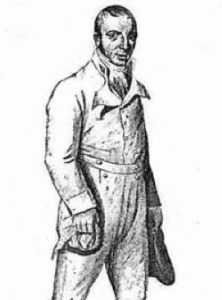
|
| Robert Barclay |
As part of the dissidence and Civil War of 17th Century England, Robert Barclay the Scotsman emerged with a point of view which was structured and reasoned in detail. What was almost unique was his reduction of it to a handful of pithy "Sound Bites". Coupled with membership in a prominent family, these abilities made him a particular friend of James, Duke of York, later King. Barclay became a Quaker at an early age.
The whole point of the Reformation was revulsion against the corrupt Catholic clergy, shielded behind some impossibly convoluted legalisms of doctrine. But for the governing establishment, any reform was going too far if it led to anarchy and chaos; combating disorder was then in many ways the central mission of the Catholic faith. The establishment did recognize that public revolt against universal micromanagement led to the scaffold for Kings who insisted on it. But in their view, the need for law and order still demanded some legitimacy, if not organized law. The Rangers, who paraded about stark naked and lived in ways resembling the hippies of the 1960s, were beyond the pale. Quakers, who professed no formal doctrine except silent meditation, might be possible just as threatening. After all, silent meditation could lead you anywhere including regicide. But the Quakers at least were quiet about it.
George Fox the founder of Quakerism had already provided one basis for containing fears of anarchy, by organizing local monthly meetings for worship within regional quarterly meetings; quarterly meetings, in turn, were within an overall framework of a yearly meeting. Occasional monthly meetings might develop a consensus for wild and antisocial behavior, indeed often did so, but would have to persuade the quarterly meetings whose members naturally outnumbered them. In extreme cases, the whole religion assembled in a yearly meeting. The innate conservatism of the meek would usually silence the extremism of the rebellious few. Very few kings would deny they could go no further toward despotism themselves, without the public behind them. The Quaker problem was to demonstrate what their consensus really was.

|
| Free Quaker Meeting House |
Essentially, the answer emerged that any religion which renounced a priesthood, which even renounced having a written doctrine, still needed some sort of institutional memory. If every Quaker began with a clean slate, to develop his own organized set of moral principles, then most of them would never get very far. Even if they did, they would have no time left for milking cows and weaving cloth. Single silent meditation was inefficient, particularly if you had faith that everyone was eventually going to arrive at the same convictions as the Sermon on the Mount. The founders of Quakerism took a chance, here. To assume the same outcome, you have to assume everyone starts with the same instincts and talents; even 21st Century America has private doubts about that one. Feudal England would have rejected it contemptuously. Carried to an extreme, it was a claim that everyone was as good a philosopher as Jesus of Nazareth, as good a person, as much a Son of God. That seemed like an arrogant claim. A more humble claim was that collectively, listening respectfully to one another in a gathered meeting, the whole world would over time reach the same truths as the Creator. If not, that still was as about as close as you were going to get to an oral memory, slowly building on the insights of the past.
Like all the early Quakers, Robert Barclay spent some time in jail. He did visit America in 1681, but it is doubtful if he spent any time here while he was Governor of East Jersey, from 1682 to 1688. The King insisted on his appointment, because he seemed the most reasonable man among the most reasonable sect of dissenters, and therefore the rebel he chose to deal with.
Blood and Honor: The Philadelphia Mafia, Lately

|
| Blood and Honor |
After two decades of seemingly endless dominance of Philadelphia headlines by the Mafia, the underworld has been absent from the news in the first decade of the 21st century. That's very welcome to everybody including the Mafia itself, and there are three main popular explanations. First, after 27 informal mob executions and four dozen convictions with lengthy prison terms, perhaps the mob has been eradicated. Or, possibly the immigrant population has been assimilated, now looking to quieter occupations for a source of income. And finally, maybe the mob has just decided to lie low while tax-hungry politicians enact enabling legislation for legal gambling casinos for the gullible public since the main argument against casinos is they attract crime. The histories of Atlantic City and Las Vegas certainly suggest organized crime has not yet abandoned casinos.
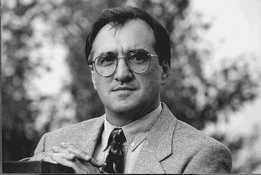
|
| George Anastasia |
George Anastasia's book Blood and Honor relates twenty years following the assassination of Angelo Bruno in 1980, averaging a murder or a prison sentence every three pages and leaving the reader with the impression of constant warfare in South Philadelphia. The book is pretty hair-raising, but after all, there is not much to talk about in a crime family except crime. To run through a brief overview of 27 assassinations and 36 major convictions is to leave a violent image of South Philadelphia. However, to say there were two to four assassinations per year plus three or four criminal trials softens that impact. The violence is appalling because it went on for so long. To note that Philadelphia like all major American cities its size, averages about three hundred murders a year puts mob violence in perspective. To be serious about eliminating homicide, you ought first eliminate "domestic violence". After that, you should go after street gangs and their focus on distributing recreational drugs.
Whether it was a struggle for control of Atlantic City casinos, a policy dispute over whether to get involved in illegal drugs, or simply a matter of disputed succession to control of the mob, is not now clear to the law-abiding community. What seems accepted interpretation is that matters heated up a lot after Angelo Bruno was assassinated. Somebody wanted his job, and that somebody wanted to run the organization differently. it's a situation quite familiar to CEOs of corporations, Kings and Emperors, and even editors of newspapers. What distinguishes organized crime families is the violence of their methods for dealing with succession issues. What emerges in this particular little world is that Nicodemo Scarfo established himself as the new Don of the Philadelphia Mafia by 1988, and the bitterness of this succession struggle induced six or ten insider members of the mob to become police informants to get revenge. The murders and convictions which make up this twenty-year period of time can be roughly divided into the initial struggle for control, the revenge of the losers, and the subsequent assassination of traitors. Even after inactivating nearly a hundred insiders, at least twice that number of "made" members and associates were unaffected directly. It's anyone's guess whether a defeat of this magnitude is enough to eliminate the organization, or whether it merely imposed a truce, during which the mob will heal its wounds and then make a comeback.
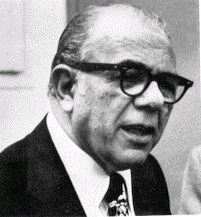
|
| Angelo Bruno |
An underground organization, whether in Philadelphia or Afghanistan, cannot hide effectively without the cooperation of honest citizens in the neighborhood. For many years, toleration was secured by keeping the streets safe from marauders belonging to other immigrant groups, and by collecting whatever debts the courts would not honor. The gray area involved such illegal activities as bootlegging in which the rest of the community participated without much sense of guilt. The Mafia was effectively a private police force for unsanctioned activity, operating within a neighborhood not fully in accord with prevailing attitudes. It seems to have been the genius of Angelo Bruno to realize that loan-sharking was the only permanently profitable component of this formula, and that loan sharking largely depended on gambling to create desperate debtors. Just about every other criminal activity attracted too much police attention to survive because the dominant society approved of suppression. Bruno's assassination seems to have been triggered by rebels who disagreed with his analysis. Perhaps they were right and the mob had been missing a big profit opportunity in the drug trade. Perhaps they were wrong and turned the legitimate community against them to the point where extermination was provoked.
Keep tuned. The outcome of this little debate could emerge suddenly and spectacularly. Or more decades of peace will pass silently, in which case Angelo will eventually be deemed correct.
REFERENCES
| Blood and Honor: Inside the Scarfo Mob, the Mafia's Most Violent Family George Anastasia ISBN-13: 978-0940159860 | Amazon |
| Before Bruno: The History of the Philadelphia Mafia Book 2 C. A. Morello ISBN: 978-0967733425 | Amazon |
| The Last Gangster George Anastasia ISBN-13: 978-0060544232 | Amazon |
| The Last Mouthpiece: The Man Who Dared to Defend the MobRobert F. Simone ISBN-13: 978-09401596932 | Amazon |
Lithuanian Law
The Right Angle Club was recently entertained by its rugby-playing, Kilimajaro-climbing member, John Wetzel, about his two-week stint teaching law students at the University of Vilnius. This ancient Lithuanian institution was founded in the 15th Century by Jesuits, and after a bumpy history of invasions and occupations has now re-established itself. It participates in Erasmus mobility, meaning it is one of 47 European universities which exchange credentials and permit students from any one of them to take courses in any other member of the association; evidently, similar mobility of faculty is also part of the concept. It sounds like a great idea, which American universities might well consider.
For reasons not entirely clear, 75% of the law students at Vilnius are female, and the whole local legal profession is similarly woman-dominated. John made several allusions to the general pulchritude of his students, which a class picture with him confirms. One striking feature of such a picture is how slim the ladies are; this is another European feature our own representatives might consider imitating. Since there are 2500 law students in a country of 3 million inhabitants, whose main industries are agricultural, balance is restored by only admitting 15% of the graduates to a passing grade on the bar examinations. It seems remarkable that studying law remains so popular under the circumstances, but it was explained that most of the graduates end up working for banks or government. Governments including our own frequently feel their laws don't apply to themselves.

|
| University of Vilnius |
If you think about it, a country which is attempting to convert from a Soviet colony to a member state of the European Community has a lot of loose ends to tie up. The title to a property is regularly clouded by the experience of confiscation by the government and then subsequently return to a free economy; if banks accept such collateral, there may well be a lot of legal work to be done to assure its security. Since the thirty-odd members of the European Community all have different legal systems in different languages, all banks and businesses which attempt to operate across borders require partners or consultants in law firms in many countries. While there is a continuous effort being made to establish some uniformity of laws in the various nations of the Community, it takes a fair amount of study just to know what the laws are and how they differ. Therefore, while a handful of lawyers are sufficient to appear in court in disputes and litigation, a great deal more legal background is required, just for businesses to know how they are expected to behave.
Since, as Justice Holmes remarked, the life of the law has not been logic, it has been experienced, it emerges that a great deal of effort must be expended to create the logic when there has been no preceding useful experience. The example is offered of American bankruptcy law, which did not exist until Robert Morris forced its creation. Morris had become an enormously wealthy man, and thus created an enormous tower of debts when his speculations failed, amounting to the then-staggering sum of $12 million of debt. They put him in debtors prison on Walnut Street, but that scarcely addressed the real problems of all those creditors tangled up in the mess. Lithuania is in a similar position, and although it has created a bankruptcy law for corporations, there is as yet no bankruptcy law covering individuals, and hence credit cards, etc. are difficult to establish.
There is a notable difference in attitudes between the eastern nations which were former members of the Soviet Union, and are intensely eager to learn more about the evolution of American law, and the more western parts of Europe, where disdain and hostility for American exceptionalism is presently dominant. A moment of reflection about this difference in a situation should make Americans more tolerant of western European problems. If the logic of law evolves out of the contemplation of experience, it may well be easier to begin without any usable experience, than to begin with centuries of experience which has to be re-examined. It must in fact be a wrenching experience, but one which has the potential to teach Americans a great many things we never had to cope with. The eventual outcome should be a healthy one, providing of course that we can keep our tempers, and acquire a little humility along the path.
Three Revolutions at Once, Maybe Four
The rise of the Tea Party movement in 2010 reopens a lifetime question in my mind. What was the American Revolutionary War all about; surely, a tax on tea isn't outrageous enough to go to war over, is it? It only aggravates curiosity to learn this particular law passed by the British Parliament, actually lowered the price of tea.
A somewhat different importance for the 21st Century is, of all the dozens or even hundreds of little civil wars that have popped up in the past two centuries, this American one seems to have had the biggest impact on the thoughts and behavior of the civilized world. The French Revolution comes close, but we meant to speak of persuasive influence on serious minds, not merely bloodiness and lasting grievance. Here are three suggestions, maybe four.
In retrospect, we can see the outlines of three major revolutions, coming together at the end of the 18th Century. The first is the Industrial Revolution, which had its beginnings in England around the city of Manchester. That was a region of major Quaker concentration, many of whom migrated to William Penn's social experiment in seeing what peace could do. The Industrial Revolution flourished in Great Britain far more readily than in France, and in a sense more than in America. But of the three major countries, America had the largest amount of unsettled land and the greatest natural resources of the three major countries. America was able to think bigger and broader, necessarily requiring broad support from an immigrant population. Diversity was often later to prove a mixed blessing, but in the Industrial Revolution it was vital.

|
| Dissent, French Style |
The second major revolution taking place at that time concerned the place of property in the life of every citizen. Up until that time, the King owned all the land and could redistribute it to suit his political needs. What critically mattered was not who formerly owned the land, but rather what was the latest King's latest word on who owned it right now. The American system gravitated to the notion that when the King or any other owner sold the land, it was no longer his; we now think that's quite self-evident. Each successive owner can sell it to his neighbor or bequeath it to his heirs, and at that moment it is no longer his, either. This idea of private property spread throughout the world, but in America, it was a clean sweep. Adopting the rather brutal rough justice of the frontier, the Indian prior ownership just didn't count. They had sided with the British in our revolution and were insistently resistant to assimilation. And anyway, Pope Nicholas in the 13th Century had established the notion of first discovery, which applied to Christians, only, and so Indians didn't count. Fair or unfair, this was going to be the way it was, from that point forward from 1787 when the Constitution was enacted. The longer the situation lasted, the more unlikely it became that it would ever change. America had so much land and so little coinage, that land itself became a sort of monetary standard. The particular American advantage was there was so much land that early settlers and landed gentry could not monopolize it; from meaning land at first, property soon meant any valuable possession. No King, particularly not George III, was going to take this away from the whole population on this side of the Atlantic. England could do as it pleased with its land and its King. If we needed Independence to preserve a general right to hold private property, plenty of men were willing to die to achieve it. And the whole Western world soon followed our example.
The third revolution was the one you read about, Lexington and Concord, Bunker Hill and the Tea Act. That whole chain of events chronicles how America came to be Independent but somehow fails to explain why we wanted Independence. The Industrial and the Property revolutions explain it better, but such theorizing would certainly mystify the Revolutionaries themselves.
And finally, one begins to wonder if we aren't toying with a reversion to the ideas underlying monarchy when we examine some currently widespread views. There's a notion going about that everybody owns everything, which if carried to an extreme means no one owns anything. When you can notice people who live on the 70th floor of a Manhattan apartment building, proclaiming a right to tell Alaskans whether or not they can drill for oil, you behold this monarchy of the many. And when you see prosperous educated adults shouting at rallies, you can see Alaskans, for example, want to tell New Yorkers to mind their own business. This land, they seem to say, isn't everybody's at all, it is mine.
It never really was entirely the King's, either. The King was a single person, sometimes a rather brutal one who wasn't likely to tolerate advice from his subjects. At times of crisis, somebody has to make a decision, any decision, and act on it. But most of the time, kings seemed to be in the position of that Czar. The one who said, "I don't rule Russia. Ten thousand clerks rule Russia."
Pennsylvania Likes Private Property Private
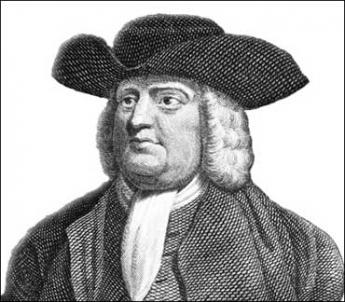
|
| William Penn Holding his Charter |
William Penn was the largest private landowner in America, maybe the whole world. He owned all of Pennsylvania, with the states of Delaware and New Jersey sort of thrown in. Although he and his descendants tried actively to sell off his real estate from 1684 to 1783, they still held an unsold three-fifths of it at the conclusion of the Revolutionary War, which they were forced to sell to the state for about fifteen cents per acre. This bit of history partly explains both the strong feeling this is private, not communal, land despite the existence of 2.3 million acres of the state forest system, which is affirmed right alongside the rather inconsistent feeling that raw land is somehow inexhaustible. Early settlers regarded the center of the state as poor farmland, particularly when compared with soil found in Lancaster and Dauphin Counties, or anticipated by settlers going to Ohio and Southern Illinois. A complimentary description is that glaciers descended to about the middle of Pennsylvania, denuding the northern half of topsoil which was then dumped on the southern part as the glaciers receded. Even today, farmers tend to avoid the northern region if they can, reciting the ancient advice from their fathers that "Only a Mennonite can make a go of it, around there."
So, lumbering had a century-long flurry in Central Pennsylvania, exhausting the trees and moving on. But that only related to the top layer of soil; beneath it lay anthracite in the East, and bituminous coal in Western Pennsylvania, supporting the steel industries of the two ends of the state with exuberant railroad development. Even today worldwide, hauling coal is the chief money-maker for railroads. The resulting availability of rail transport promotes the location of heavy industry near coal regions; the 20th Century decline of coal demand ultimately hurried the decline of heavy industry in the state by impairing the railroads.
Beneath all this lie the aquifers, porous caverns of fresh water. And beneath that, largely unsuspected for two centuries, lie the sedimentary deposits of a huge inland sea, compressed into petroleum which evaporates into natural gas. All of this is held by huge deposits of semi-porous shale rock, now mostly 8000 feet deep, stretching from Canada to Texas and called the Marcellus shale formation. If it can be economically recovered, there is more natural gas than in Arabia, and there is a similar formation along the near side of the Rocky Mountains in Colorado, stretching up to the Athabasca tar sands in Canada. There is another similar formation in France underneath Paris. No doubt, we will find the whole world has similar huge deposits for which the main problem has always been: how do you get it out?
There's another question, of course, of who owns it. Those who clearly do not own it maintain that everyone owns it. In the western world, most particularly in America, it is our firm belief that if you live on top of it, you own it. Since it is expensive to extract, quarrels like this are usually settled by purchasing mineral rights from the surface owner, who generally could not possibly extract it by himself. Those who assert they have a conflicting right to it because it belongs to everyone can expect belligerent resistance. At the present time when America faces a critical fifteen year period of dwindling oil supply, ultimately relieved by perfecting alternative energy sources, there is too little time to achieve consensus for any other governance theory. The problem which could possibly gain enough traction to interfere is the issue of potential damage to others which might result from the extraction of this subsurface treasure. Because of the apparent urgency of a decision to extract or go elsewhere to extract, the best we can hope for is some fairly rough justice.
Original Intent and the Miranda Decision
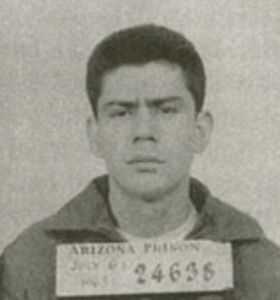
|
| Ernesto Arturo Miranda |
At the lunch table of the Franklin Inn Club recently, the Monday Morning Quarterbacks listened to a debate about Guantanamo Bay, prisoner torture and police brutality; all of which centered on the Supreme Court decision known as Miranda v Arizona. Ernesto Arturo Miranda was convicted without being warned of his right to remain silent, sentenced to 20 to 30 years in prison in 1966. Eventually, the U.S. Supreme Court, with Chief Justice Earl Warren writing a 5-4 decision, overturned the conviction, because Miranda had not been officially warned of his right to remain silent. The case was retried and Miranda was convicted and imprisoned on the basis of other evidence that included no confession.
An important fact about this case was that Congress soon wrote legislation making the reading of "Miranda Rights" unnecessary, but the Supreme Court then declared in the Dickerson case that Congress had no right to overturn a Constitutional right. Some of the subsequent fury about the Miranda case concerned the legal box it came in, with empowering the Supreme Court to create a new right that is not found in the written Constitution. Worse still, declaring it was not even subject to any other challenge by the other branches of government. In the view of some, this was a judicial power grab in a class with Marbury v Madison.
Several lawyers were at the lunch table on Camac Street, seemingly in agreement that Miranda was a good thing because the core of it was not to forbid unwarned interrogation, but rather a desirable refinement of court procedure to prohibit the introduction of such evidence into a trial. The lawyers pointed out the majority of criminal cases simply skirt this sort of evidence, use other sorts of evidence, and the criminals are routinely sent or not sent to jail without much influence from the Miranda issue. Indeed, Miranda himself was subsequently imprisoned on the basis of evidence which excluded his confession. What's all the fuss about?
And then, the agitated non-lawyers at the lunch table proceeded to display how deeper issues have overtaken this little rule of procedure. This Miranda principle prevents police brutality. Answer: It does not; it only prevents the use of testimony obtained by brutality from being introduced at trial. Secondly, Miranda contains an exception for issues of immediate public safety. Answer: What difference does that make, as long as the authorities refrain from using the confession in court? The chances are good that a person visibly endangering public safety is going to be punished without a confession. Further, the detailed procedures within Miranda encourage fugitives to discard evidence before they are officially arrested in a prescribed way. Answer: If the police officer sees guns or illicit drugs being thrown on the ground, do you think he needs a confession? Well, what about Guantanamo Bay? Answer: What about it? We understand the prisoners are there mainly to obtain information about the conspiracy abroad and to keep them from rejoining it. The alternative would likely be their execution, either by our capturing troops or by vengeful co-conspirators they had incriminated.
Somehow, this cross-fire seemed unsatisfying. The Miranda decision was made by a 5-4 majority, meaning a switch of a single vote would have reversed the outcome. The private discussions of the justices are secret, but it seems likely that some Justices were swayed by this edict viewed as a simple improvement in court procedure rather than a constitutional upheaval; Justices with that viewpoint feel they know the original intent and approve of it. Others are apprehensive the decision has already migrated from the original intent, in an alarming way. Everyone who watches much crime television and even many police officials feels that Miranda intends for all suspects to be tried on the basis of total isolation from interrogation from start to finish. More reasoned observers are alarmed that the process of discrediting all interrogation will lead to an ongoing disregard of the opinion of lawyers about court procedure, essentially the process of allowing public misunderstanding to overturn legal standards. Chief Justice William Renquist, no less, poured gasoline on this anxiety by declaring that Miranda has "become part of our culture".
What seems to be on display is the mechanism by which Constitutional interpretation drifts from the original intent. Not so much a matter of "Judicial Activism" which is "legislating from the bench", it is becoming a matter of non-lawyers confusing and stirring up the crowds until the Justices simply give up the argument. Drift is one thing; virtual bonfires and virtual torch-light parades are quite another.
Last Will of Benjamin Franklin
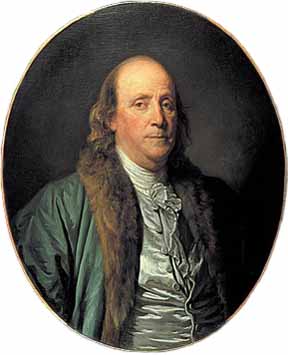
|
| Benjamin Franklin |
The Last Will and Testament of Benjamin Franklin
I, Benjamin Franklin, of Philadelphia, printer, late Minister Plenipotentiary from the United States of America to the Court of France, now President of the State of Pennsylvania, do make and declare my last will and testament as follows:
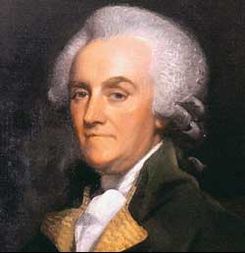
|
| William Franklin |
To my son, William Franklin, late Governor of the Jerseys, I give and devise all the lands I hold or have a right to, in the province of Nova Scotia, to hold to him, his heirs, and assigns forever. I also give to him all my books and papers, which he has in his possession, and all debts standing against him on my account books, willing that no payment for, nor restitution of, the same be required of him, by my executors. The part he acted against me in the late war, which is of public notoriety, will account for my leaving him no more of an estate he endeavored to deprive me of.
Having since my return from France demolished the three houses in Market Street, between Third and Fourth Streets, fronting my dwelling-house, and erected two new and larger ones on the ground, and having also erected another house on the lot which formerly was the passage to my dwelling, and also a printing-office between my dwelling and the front houses; now I do give and devise my said dwelling-house, wherein I now live, my said three new houses, my printing- office and the lots of ground thereto belonging; also my small lot and house in Sixth Street, which I bought off the widow Henmarsh; also my pasture-ground which I have in Hickory Lane, with the buildings thereon; also my house and lot on the North side of Market Street, now occupied by Mary Jacobs, together with two houses and lots behind the same, and fronting on Pewter-Platter Alley; also my lot of ground in Arch Street, opposite the church-burying ground, with the buildings thereon erected; also all my silver plate, pictures, and household goods, of every kind, now in my said dwelling-place, to my daughter, Sarah Bache, and to her husband, Richard Bache, to hold to them for and during their natural lives, and the life of the longest liver of them, and from and after the decease of the survivor of them, I do give, devise, and bequeath to all children already born, or to be born of my said daughter, and to their heirs and assigns forever, as tenants in common, and not as joint tenants.
And, if any or either of them shall happen to die under age, and without issue, the part and share of him, her, or them, so dying, shall go to and be equally divided among the survivors or survivor of them. But my intention is, that, if any or either of them should happen to die under age, leaving issue, such issue shall inherit the part and share that would have passed to his, her, or their parent, had he, she, or they were living.
And, as some of my said devisees may, at the death of the survivor of their father or mother, be of age, and others of them underage, so as that all of them may not be of capacity to make division, I in that case request and authorize the judges of the Supreme Court of Judicature of Pennsylvania for the time being, or any three of them, not personally interested, to appoint by writing, under their hands and seals, three honest, intelligent, impartial men to make the said division, and to assign and allot to each of my devisees their respective share, which division, so made and committed to writing under the hands and seals of the said three men, or any two of them, and confirmed by the said judges, I do hereby declare shall be binding on, and conclusive between the said devisees.
All the lands near the Ohio, and the lots near the centre of Philadelphia, which I lately purchased of the State, I give to my son-in-law, Richard Bache, his heirs and assigns forever; I also give him the bond I have against him, of two thousand and one hundred and seventy-two pounds, five shillings, together with the interest that shall or may accrue thereon, and direct the same to be delivered up to him by my executors, canceled, requesting that, in consideration thereof, he would immediately after my decease manumit and set free his Negro man Bob. I leave to him, also, the money due to me from the State of Virginia for types. I also give to him the bond of William Goddard and his sister, and the counter bond of the late Robert Grace, and the bond and judgment of Francis Childs, if not recovered before my decease, or any other bonds, except the bond due from ----- Killian, of Delaware State, which I give to my grandson, Benjamin Franklin Bache. I also discharge him, my said son-in-law, from all claim and rent of money due to me, on book account or otherwise. I also give him all my musical instruments.
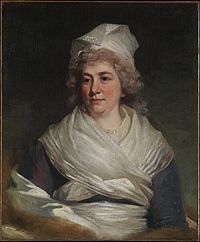
|
| Sarah Bache |
The king of France's picture, set with four hundred and eight diamonds, I give to my daughter, Sarah Bache, requesting , however, that she would not form any of those diamonds into ornaments either for herself or daughters, and thereby introduce or countenance the expensive, vain, and useless fashion of wearing jewels in this country; and those immediately connected with the picture may be preserved with the same.
I give and devise to my dear sister, Jane Mecom, a house and lot I have in Unity Street, Boston, nor or late under the care of Mr. Jonathan Williams, to her and to her heirs and assigns forever. I also give her the yearly sum of fifty pounds sterling, during life, to commence at my death, and to be paid to her annually out of the interests or dividends arising on twelve shares which I have since my arrival at Philadelphia purchased in the Bank of North America, and, at her decease, I give the said twelve shares in the bank to my daughter, Sarah Bache, and her husband, Richard Bache. But it is my express will and desire that, after the payment of the above fifty pounds sterling annually to my said sister, my said daughter be allowed to apply the residue of the interest or dividends on those shares to her sole and separate use, during the life of my said sister, and afterwards the whole of the interest or dividends thereof as her private pocket money.
I give the right I have to take up to three thousand acres of land in the State of Georgia, granted to me by the government of that State, to my grandson, William Temple Franklin, his heirs and assigns forever. I also give to my grandson, William Temple Franklin, the bond and judgment I have against him of four thousand pounds sterling, my right to the same to cease upon the day of his marriage; and if he dies unmarried, my will is, that the same be recovered and divided among my other grandchildren, the children of my daughter, Sarah Bache, in such manner and form as I have herein before given to them the other parts of my estate.
The philosophical instruments I have in Philadelphia I give to my ingenious friend, Francis Hopkinson.
To the children, grandchildren, and great-grandchildren of my brother, Samuel Franklin, that may be living at the time of my decease, I give fifty pounds sterling, to be equally divided among them. To the children, grandchildren, and great-grandchildren of my sister, Anne Harris, that may be living at the time of my decease, I give fifty pounds sterling to be equally divided among them. To the children, grandchildren, and great-grandchildren of my brother James Franklin, that may be living at the time of my decease, I give fifty pounds sterling to be equally divided among them. To the children, grandchildren, and great-grandchildren of my sister, Sarah Davenport, that may be living at the time of my decease, I give fifty pounds sterling to be equally divided among them. To the children, grandchildren, and great-grandchildren of my sister, Lydia Scott, that may be living at the time of my decease, I give fifty pounds sterling to be equally divided among them. To the children, grandchildren, and great-grandchildren of my sister, Jane Mecom, that may be living at the time of my decease, I give fifty pounds sterling to be equally divided among them.
I give to my grandson, Benjamin Franklin Bache, all the types and printing materials, which I now have in Philadelphia, with the complete letter foundry, which, in the whole, I suppose to be worth near one thousand pounds; but if he should die under age, then I do order the same to be sold by my executors, the survivors or survivor of them, and the money be equally divided among all the rest of my said daughter's children, or their representatives, each one on coming of age to take his or her share, and the children of such of them as may die under age to represent and to take the share and proportion of, the parent so dying, each one to receive his or her part of such share as they come of age.
With regard to my books, those I had in France and those I left in Philadelphia, is now assembled together here, and a catalog made of them, it is my intention to dispose of them as follows: My "History of the Academy of Sciences," in sixty or seventy volumes quarto, I give to the Philosophical Society of Philadelphia, of which I have the honor to be President. My collection in a folio of "Les Arts et les Metiers," I give to the American Philosophical Society, established in New England, of which I am a member. My quarto edition of the same, "Arts et Metiers," I give to the Library Company of Philadelphia. Such and so many of my books as I shall mark on my said catalog with the name of my grandson, Benjamin Franklin Bache, I do hereby give to him; and such and so many of my books as I shall mark on the said catalog with the name of my grandson, William Bache, I do hereby give to him; and such as shall be marked with the name of Jonathan Williams, I hereby give to my cousin of that name. The residue and remainder of all my books, manuscripts, and papers, I do give to my grandson, William Temple Franklin. My share in the Library Company of Philadelphia, I give to my grandson, Benjamin Franklin Bache, confiding that he will permit his brothers and sisters to share in the use of it.
I was born in Boston, New England, and owe my first instructions in literature to the free grammar schools established there. I, therefore, give one hundred pounds sterling to my executors, to be by them, the survivors or survivor of them, paid over to the managers or directors of the free schools in my native town of Boston, to be by them, or by those person or persons, who shall have the superintendence and management of the said schools, put out to interest, and so continued at interest forever, which interest annually shall be laid out in silver medals, and given as honorary rewards annually by the directors of the said free schools belonging to the said town, in such manner as to the discretion of the selectmen of the said town shall seem meet.
Out of the salary that may remain due to me as President of the State, I do give the sum of two thousand pounds sterling to my executors, to be by them, the survivors or survivor of them, paid over to such person or persons as the legislature of this State by an act of Assembly shall appoint to receive the same in trust, to be employed for making the river Schuylkill navigable.
And what money of mine shall, at the time of my decease, remain in the hands of my bankers, Messrs. Ferdinand Grand and Son, at Paris, or Messrs. Smith, Wright, and Gray, of London, I will that, after my debts are paid and deducted, with the money legacies of this my will, the same be divided into four equal parts, two of which I give to my dear daughter, Sarah Bache, one to her son Benjamin, and one to my grandson, William Temple Franklin.
During the number of years I was in business as a stationer, printer, and postmaster, a great many small sums became due for books, advertisements, postage of letters, and other matters, which were not collected when, in 1757, I was sent by the Assembly to England as their agent, and by subsequent appointments continued there till 1775, when on my return, I was immediately engaged in the affairs of Congress and sent to France in 1776, where I remained nine years, not returning till 1785, and the said debts, not being demanded in such a length of time, are become in a manner obsolete, yet are nevertheless justly due. These, as they are stated in my great folio ledger E, I bequeath to the contributors to the Pennsylvania Hospital, hoping that those debtors, and the descendants of such as are deceased, who now, as I find, make some difficulty of satisfying such antiquated demands as just debts, may, however, be induced to pay or give them as charity to that excellent institution. I am sensible that much must inevitably be lost, but I hope something considerable may be recovered. It is possible, too, that some of the parties charged may have existing old, unsettled accounts against me; in which case the managers of the said hospital will allow and deduct the amount, or pay the balance if they find it against me.
My debts and legacies being all satisfied and paid, the rest and residue of all my estate, real and personal, not herein expressly disposed of, I do give and bequeath to my son and daughter, Richard and Sarah Bache.
I request my friends, Henry Hill, Esquire, John Jay, Esquire, Francis Hopkinson, Esquire, and Mr. Edward Duffield, of Benfield, in Philadelphia County, to be the executors of this my last will and testament; and I hereby nominate and appoint them for that purpose.
I would have my body buried with as little expense or ceremony as may be. I revoke all former wills by me made, declaring this only to be my last.
In witness whereof, I have hereunto set my hand and seal, this seventeenth day of July, in the year of our Lord, one thousand seven hundred and eighty-eight.
B. Franklin
Signed, sealed, published, and declared by the above named Benjamin Franklin, for and as his last will and testament, in the presence of us.
Abraham Shoemaker, John Jones, George Moore.
CODICIL
I, Benjamin Franklin, in the foregoing or annexed last will and testament named, having further considered the same, do think proper to make and publish the following codicil or addition thereto.
It has long been a fixed political opinion of mine, that in a democratical state there ought to be no offices of profit, for the reasons I had given in an article of my drawing in our constitution, it was my intention when I accepted the office of President, to devote the appointed salary to some public uses. Accordingly, I had already, before I made my will in July last, given large sums of it to colleges, schools, the building of churches, etc.; and in that will I bequeathed two thousand pounds more to the State for the purpose of making the Schuylkill navigable. But understanding since that such a work, and that the project is not likely to be undertaken for many years to come, and having entertained another idea, that I hope may be more extensively useful, I do hereby revoke and annul that bequest, and direct that the certificates I have for what remains due to me of that salary be sold, towards raising the sum of two thousand pounds sterling, to be disposed of as I am now about to order.
It has been an opinion, that he who receives an estate from his ancestors is under some kind of obligation to transmit the same to their posterity. This obligation does not lie on me, who never inherited a shilling from an ancestor or relation. I shall, however, if it is not diminished by some accident before my death, leave a considerable estate among my descendants and relations. The above observation is made as merely as some apology to my family for making bequests that do not appear to have any immediate relation to their advantage.
I was born in Boston, New England, and owe my first instructions in literature to the free grammar schools established there. I have, therefore, already considered these schools in my will. But I am also under obligations to the State of Massachusetts for having, unasked, appointed me formerly their agent in England, with a handsome salary, which continued some years; and although I accidentally lost in their service, by transmitting Governor Hutchinson's letters, much more than the amount of what they gave me, I do not think that ought in the least to diminish my gratitude.
I have considered that, among artisans, good apprentices are most likely to make good citizens, and, having myself been bred to a manual art, printing, in my native town, and afterward assisted to set up my business in Philadelphia by kind loans of money from two friends there, which was the foundation of my fortune, and all the utility in life that may be ascribed to me, I wish to be useful even after my death, if possible, in forming and advancing other young men, that may be serviceable to their country in both these towns. To this end, I devote two thousand pounds sterling, of which I give one thousand thereof to the inhabitants of the town of Boston, in Massachusetts, and the other thousand to the inhabitants of the city of Philadelphia, in trust, to and for the uses, intents, and purposes hereinafter mentioned and declared.
The said sum of one thousand pounds sterling, if accepted by the inhabitants of the town of Boston, shall be managed under the direction of the selectmen, united with the ministers of the oldest Episcopalians, Congregational, and Presbyterian churches in that town, who are to let out the sum upon interest, at five per cent, per annum, to such young married artificers, under the age of twenty-five years, as have served an apprenticeship in the said town, and faithfully fulfilled the duties required in their indentures, so as to obtain a good moral character from at least two respectable citizens, who are willing to become their sureties, in a bond with the applicants, for the repayment of the moneys so lent, with interest, according to the terms hereinafter prescribed; all which bonds are to be taken for Spanish milled dollars, or the value thereof in current gold coin; and the managers shall keep a bound book or books, wherein shall be entered the names of those who shall apply for and receive the benefits of this institution, and of their sureties, together with the sums lent, the dates, and other necessary and proper records respecting the business and concerns of this institution. And as these loans are intended to assist young married artificers in setting up their business, they are to be proportioned by the discretion of the managers, so as not to exceed sixty pounds sterling to one person, nor to be less than fifteen pounds; and if the number of appliers so entitled should be so large as that the sum will not suffice to afford to each as much as might otherwise not be improper, the proportion to each shall be diminished so as to afford to everyone some assistance. These aids may, therefore, be small at first, but, as the capital increases by the accumulated interest, they will be ampler. And in order to serve as many as possible in their turn, as well as to make the repayment of the principal borrowed easier, each borrower shall be obliged to pay, with the yearly interest, one-tenth part of the principal and interest, so paid in, shall be again let out to fresh borrowers.
And, as it is presumed that there will always be found in Boston virtuous and benevolent citizens, willing to bestow a part of their time in doing good to the rising generation, by superintending and managing this institution gratis, it is hoped that no part of the money will at any time be dead, or be diverted to other purposes, but be continually augmenting by the interest; in which case there may, in time, be more than the occasions in Boston shall require, and then some may be spared to the neighboring or other towns in the said State of Massachusetts, who may desire to have it; such towns engaging to pay punctually the interest and the portions of the principal, annually, to the inhabitants of the town of Boston.
If this plan is executed, and succeeds as projected without interruption for one hundred years, the sum will then be one hundred and thirty-one thousand pounds; of which I would have the managers of the donation to the town of Boston then layout, at their discretion, one hundred thousand pounds in public works, which may be judged of most general utility to the inhabitants, such as fortifications, bridges, aqueducts, public buildings, baths, pavements, or whatever may make living in the town more convenient to its people, and render it more agreeable to strangers resorting thither for health or a temporary residence. The remaining thirty-one thousand pounds I would have continued to be let out on interest, in the manner above directed, for another hundred years, as I hope it will have been found that the institution has had a good effect on the conduct of youth, and been of service to many worthy characters and useful citizens. At the end of this second term, if no unfortunate accident has prevented the operation, the sum will be four million and sixty-one thousand pounds sterling, of which I leave one million sixty-one thousand pounds to the disposition of the inhabitants of the town of Boston, and three million to the disposition of the government of the state, not presuming to carry my views farther.
All the directions herein given, respecting the disposition and management of the donation to the inhabitants of Boston, I would have observed respecting that to the inhabitants of Philadelphia, only, as Philadelphia is incorporated, I request the corporation of that city to undertake the management agreeably to the said directions; and I do hereby vest them with full and ample powers for that purpose. And, having considered that the covering a ground plot with buildings and pavements, which carry off most of the rain and prevent its soaking into the Earth and renewing and purifying the Springs, whence the water of wells must gradually grow worse, and in time be unfit for use, as I find has happened in all old cities, I recommend that at the end of the first hundred years, if not done before, the corporation of the city Employ a part of the hundred thousand pounds in bringing, by pipes, the water of Wissahickon Creek into the town, so as to supply the inhabitants, which I apprehend may be done without great difficulty, the level of the creek is much above that of the city, and may be made higher by a dam. I also recommend making the Schuylkill completely navigable. At the end of the second hundred years, I would have the disposition of the four million and sixty-one thousand pounds divided between the inhabitants of the city of Philadelphia and the government of Pennsylvania, in the same manner as herein directed with respect to that of the inhabitants of Boston and the government of Massachusetts.
It is my desire that this institution should take place and begin to operate within one year after my decease, for which purpose due notice should be publicly given previous to the expiration of that year, that those for whose benefit this establishment is intended may make their respective applications. And I hereby direct my executors, the survivors or survivor of them, within six months after my decease, to pay over the sum of two thousand pounds sterling to such persons as shall be duly appointed by the Selectmen of Boston and the corporation of Philadelphia, to receive and take charge of their respective sums, of one thousand pounds each, for the purposes aforesaid.
Considering the accidents to which all human affairs and projects are subject in such a length of time, I have, perhaps, too much flattered myself with a vain fancy that these dispositions, if carried into execution, will be continued without interruption and have the effects proposed. I hope, however, that is the inhabitants of the two cities should not think fit to undertake the execution, they will, at least, accept the offer of these donations as a mark of my good will, a token of my gratitude, and a testimony of my earnest desire to be useful to them after my departure.
I wish, indeed, that they may both undertake to endeavor the execution of the project, because I think that, though unforeseen difficulties may arise, expedients will be found to remove them, and the scheme be found practicable. If one of them accepts the money, with the conditions, and the other refuses, my will then is, that both Sums be given to the inhabitants of the city accepting the whole, to be applied to the same purposes, and under the same regulations directed for the separate parts; and, if both refuse, the money, of course, remains in the mass of my Estate, and is to be disposed of therewith according to my will made the Seventeenth day of July, 1788.
I wish to be buried by the side of my wife, if it may be, and that a marble stone, to be made by Chambers, six feet long, four feet wide, plain, with only a small molding around the upper edge, and this inscription:
Benjamin And Deborah Franklin 178-
to be placed over us both. My fine crab-tree walking stick, with a gold head, curiously wrought in the form of the cap of liberty, I give to my friend, and the friend of mankind, General Washington. If it were a Sceptre, he has merited it and would become it. It was a present to me from that excellent woman, Madame de Forbach, the Dowager Duchess of Deux-Ponts, connected with some verses which should go with it. I give my gold watch to my son-in-law Richard Bache, and also the gold watch chain of the Thirteen United States, which I have not yet worn. My timepiece, that stands in my library, I give to my grandson, William Temple Franklin. I give him also my Chinese gong. To my dear old friend, Mrs. Mary Hewson, I give one of my silver tankards marked for her use during her life, and after her decease, I give it to her daughter Eliza. I give to her son, William Hewson, who is my godson, my new quarto Bible, and also the botanic description of the plants in the Emperor's garden at Vienna, in folio, with colored cuts.
And to her son, Thomas Hewson, I give a set of "Spectators, Tattlers, and Guardians" handsomely bound.
There is an error in my will, where the bond of William Temple Franklin is mentioned as being four thousand pounds sterling, whereas it is but for three thousand five hundred pounds.
I give to my executors, to be divided equally among those that act, the sum of sixty pounds sterling, as some compensation for their trouble in the execution of my will; and I request my friend, Mr. Duffield, to accept moreover my French waywiser, a piece of clockwork in Brass, to be fixed to the wheel of any carriage; and that my friend, Mr. Hill, may also accept my silver cream pot, formerly given to me by the good Doctor Fothergill, with the motto, Keep bright the Chain. My reflecting telescope, made by Short, which was formerly Mr. Canton's, I give to my friend, Mr. David Rittenhouse, for the use of his observatory.
My picture, drawn by Martin, in 1767, I give to the Supreme Executive Council of Pennsylvania, if they shall be pleased to do me the honor of accepting it and placing it in their chamber. Since my will was made I have bought some more city lots, near the center part of the estate of Joseph Dean. I would have them go with the other lots, disposed of in my will, and I do give the same to my Son-in-law, Richard Bache, to his heirs and assigns forever.
In addition to the annuity left to my sister in my will, of fifty pounds sterling during her life, I now add thereto ten pounds sterling more, in order to make the Sum sixty pounds. I give twenty guineas to my good friend and physician, Dr. John Jones.
With regard to the separate bequests made to my daughter Sarah in my will, my intention is, that the same shall be for her sole and separate use, notwithstanding her coverture, or whether she be covert or sole; and I do give my executors so much right and power therein as may be necessary to render my intention effectual in that respect only. This provision for my daughter is not made out of any disrespect I have for her husband.
And lastly, it is my desire that this, my present codicil, be annexed to, and considered as part of, my last will and testament to all intents and purposes.
In witness whereof, I have hereunto set my hand and Seal this twenty-third day of June, Anno Domini one thousand Seven hundred and eighty-nine.
B. Franklin.
Signed, sealed, published, and declared by the above named Benjamin Franklin to be a codicil to his last will and testament, in the presence of us.
Francis Bailey, Thomas Lang, Abraham Shoemaker.
Regulation Precision: Not Entirely a Good Idea
Owen Roberts: A Switch in Time
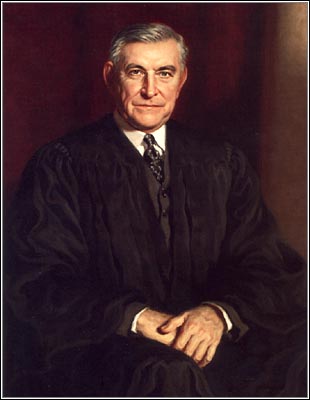
|
| Owen Roberts |
To this day, no one knows quite what to make of Owen J. Roberts, founder of one of Philadelphia's largest law firms. He was Prosecutor of the Teapot Dome scandal, Dean of the University of Pennsylvania Law School, Republican appointee to the U.S. Supreme Court. But then, he abruptly became the source of one of the most radical revisions of our system of government since the Declaration of Independence. Nothing in his prior career and nothing afterward in his subsequent civic-minded retirement from the Court seemed to suggest any radical turn of character had taken place. He has been compared with a famous baseball pitcher who threw right-handed or left-handed at will, unexpectedly, capriciously, who knows why.
The issue went far beyond one clause in the Constitution, but the commerce clause was the focus point. Under the limited and enumerated powers allowed to Congress by the Constitution was :
The Congress shall have power to regulate commerce with foreign nations, and among the several states, and with the Indian tribes.
That used to be called the interstate commerce clause until the Supreme Court announced its decision in the case of Wickard v. Filburn. When linked with the Tenth Amendment, granting to the States the power to regulate everything not specifically granted to the Federal government, this clause in the Constitution was universally taken to mean that the States had control of commerce within their borders, while Congress would control interstate commerce. Wickard v. Filburn took all that power from the states and gave it to Congress, which henceforth would regulate commerce. John Marshall had certainly triumphed over the hated state legislatures, but the Supreme Court suddenly lost its power to overrule Congress, too. One side had won the old argument, by silencing the umpire. No wonder Franklin Roosevelt started annual celebrations called Jefferson-Jackson Day dinners.
To describe the background: The 1929 stock market crash was quickly followed by the economic Depression of the 1930s. Nothing of this magnitude had been seen before, and there was a stampede to try new and untested solutions. Even government action which actually worsened economic conditions was felt justified if it conveyed to the frightened public the image that its leaders were taking firm action. Since Socialism and Communism were among the solutions grasped for, many unfortunate actions were felt justified as a way to control the Bolshevik threat. Many of these New Deal actions were declared unconstitutional by the Supreme Court since they involved sweeping revisions in the way all commerce, internal to the States as well as interstate, was conducted.
The Depression and financial panic continued through the 1936 Presidential election, which Roosevelt won in a landslide. Immediately after the start of the new term, he announced a plan to increase the number of Justices on the Supreme Court, appointing new ones more to his liking. He was at pains to point out that seven of the nine life incumbents had been appointed by Republican Presidents. This was, of course, the restraint intended by the Constitutional Convention, and the idea of packing the Court with new appointees was exactly what Jefferson and Jackson had tried to do.
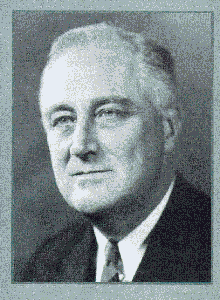
|
| Franklin Roosevelt |
In the meantime, the case of Filburn, a dairy farmer, came up. One of the New Deal agencies had assigned him a quota of 200 bushels of wheat he could grow on the side, as part of an effort to raise wheat prices by reducing supply. Filburn had raised 400 bushels, but consumed the extra wheat for his own personal use, hardly a matter of interstate commerce. The Court had repeatedly declared laws like this to exceed the interstate commerce limitation and were thus unconstitutional for the Congress to enact.
Well, Owen Roberts changed his position, Filburn lost his case. Forever afterward, this change of position was referred to as the switch in time, that saved nine. Since that time, the Court has rarely had the courage to rule any action of Congress unconstitutional, even though it is true that Congress promptly and resoundingly rejected the court-packing proposal.
And furthermore, the power of the state legislatures has shriveled because all commerce (except insurance and real estate) is federally regulated, with a corresponding vast increase in the size of the Federal bureaucracy, as Congress relentlessly pushes to intervene in commerce among the several states, formerly known as the Interstate Commerce Clause. Franklin Roosevelt had a certain right to gloat at Jefferson-Jackson Day dinners.
A few weeks before he died, Owen Roberts had all his papers burned. Apparently, we will never know whether the present outcome was the result he had in mind. Since he was later the author of Alfred Barnes' will, which strenuously sought to prevent the transfer of the Barnes art collection to Philadelphia County, anything written by a lawyer can apparently be reversed by other lawyers. One would have supposed that either the Original Intent would govern, or else the opinion of the Supreme Court on what the Constitution means, would prevail. Franklin Roosevelt showed us there is a third possibility: the President can overrule the Court by intimidating it.
Franklin Endorses the Constitution
Monday Sepr. 17, 1787. In Convention (6th and Chestnut, Philadelphia).
The Engrossed Constitution being read, Doctor. Franklin rose with a Speech in his hand, which he had reduced to writing for his own convenience, and which Mr. Wilson read in the words following:
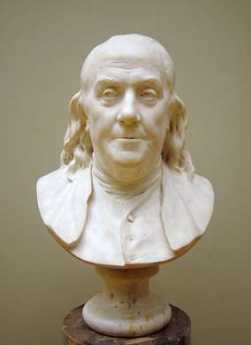
|
| Bust of Benjamin Franklin |
I confess that there are several parts of this constitution which I do not at present approve, but I am not sure I shall never approve them: For having lived long, I have experienced many instances of being obliged by better information or fuller consideration, to change opinions even on important subjects, which I once thought right, but found to be otherwise. It is therefore that the older I grow, then after I am to doubt my own judgment and to pay more respect to the judgment of others. Most men indeed as well as most sects in Religion, think themselves in possession of all truth, and that wherever others differ from them it is so far error. Steele, a Protestant in a Dedication tells the Pope, that the only difference between our Churches in their opinions of the certainty of their doctrines is, the Church of Rome is infallible and the Church of England is never in the wrong. But though many private persons think almost as highly of their own infallibility as of that of their sect, few express it so naturally as a certain French lady, who in a dispute with her sister, said, "I don't know how it happens, Sister, but I meet with nobody but myself, that's always in the right"- "Il n'y a que moi quia Toujours reason."
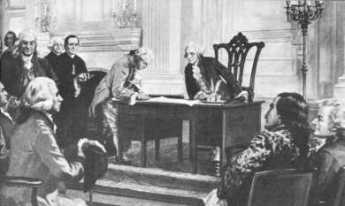
|
| The signing of the Constitution |
In these sentiments, Sir, I agree to this Constitution with all its faults, if they are such; because I think a general Government necessary for us, and there is no form of Government but what may be a blessing to the people if well administered, and believe farther that this is likely to be well administered for a course of years, and can only end in Despotism, as other forms have done before it, when the people shall become so corrupted as to need despotic Government, being incapable of any other. I doubt too whether any other Convention we can obtain may be able to make a better Constitution. For when you assemble a number of men to have the advantage of their joint wisdom, you inevitably assemble with those men, all their prejudices, their passions, their errors of opinion, their local interests, and their selfish views. From such an Assembly can a perfect production be expected? It, therefore, astonishes me, Sir, to find this system approaching so near to perfection as it does; and I think it will astonish our enemies, who are waiting with confidence to hear that our councils are confounded like those of the Builders of Babel; and that our States are on the point of separation, only to meet hereafter for the purpose of cutting one another's throats. Thus I consent, Sir, to this Constitution because I expect no better, and because I am not sure, that it is not the best. The opinions I have had of its error, I sacrifice to the public good--I have never whispered a syllable of them abroad-- Within these walls they were born, and here they shall die--If every one of us in returning to our Constituents were to report the objections he has had to it, and endeavor to gain partisans in support of them, we might prevent it is being generally received, and thereby lose all the salutary effects and great advantages resulting naturally in our favor among foreign Nations as well as among ourselves, from our real or apparent unanimity. Much of the strength and efficiency of any Government in procuring and securing happiness to the people, depends, on opinion, on the general opinion of the goodness of the Government, as well as of the wisdom and integrity of its Governors. I hope therefore that for our own sakes as a part of the people and for the sake of our posterity, we shall act heartily and unanimously in recommending this Constitution (if approved by Congress and confirmed by the Conventions) wherever our influence may extend, and turn our future thoughts and endeavors to the means of having it well administered.
On the whole, Sir, I cannot help expressing a wish that every member of the Convention who may still have objections to it, would with me, on this occasion doubt a little of his own infallibility--and to make manifest our unanimity, put his name to this instrument.
He then moved that the Constitution be signed.
When the last members were signing it, Doctor Franklin looking towards the President's Chair, at the back of which a rising sun happened to be painted, observed to a few members near him, that Painters had found it difficult to distinguish in their art a rising from a setting sun. I have, said he, often and often in the course of the Session, and the vicissitudes of my hopes and fears as to its issues, looked at that behind the President without being able to tell whether it was rising or setting: But now at length I have the happiness to know that it is a rising and not a setting Sun.
WILLIAM BLATHWAYT'S DRAFT OF THE CHARTER OF PENNSYLVANIA
Charles the Second, by the grace of [God] King of England, Scotland, France, and Ireland, Defend[er] of the Faith & Co. To all to whom these presents shall come, greeting.
Whereas our truste[d] and well beloved subject William Penn Esquire, sonne and heire of Sir William Penn, deceased, out of a comendable desire to enlarge our English Empire and promote such usefull comodities as may be of benefit to us and our dominions, as also to reduce the Savage Natives by Gentle and just manners to the Love of civill Society and Christian Religion, hath humbly besought leave of us to transport an ample Colony unto a certaine Country hereinafter described in the parte of America not yet cultivated and planted. And hath likewise humbly besought our Royall Ma[jes]tie to give, grant, and confirme all the said Country with certaine priviledges and Jurisdicions requisite for the good government and safety of the said Country and Colony, to him and his heires for ever. Know yee therefore that wee, favoring the petition and good purpose of the said William Penn, and haveing regard to the memory and merits of his late Father in diverse services and particularly to his conduct, courage, and dircctione {discretion} under our dearest Brother James, Duke of Yorke, in that signall Battle and Victorie fought and obtained against the Dutch Fleet comanded by [illegible word deleted] {The}2 Heer Van Obdam in the yeare 1653. In consideration thereof of our speciall grace, certaine knowledge, and meere motion have given and granted and by this our present Charter for us our heires and successors, doe give and grant unto the said William Penn his heires and Assignes
All that Tract or part of Land of {in}4 America with all the Islands therein contained as the same is bounded on the East by Delaware River from Twelve miles distance Northwards of Newcastle Towne unto the Three and Fortieth degree of Northerne Latitude, If the said River doth extend soe farr northwards. But if the said River shall not extend soe farr northward. then by the said River soe farr as it doth extend, and from the Head of the said River, the Eastern-bounds are to be determined by a Meridian Line to bee drawne from the head of the said River unto the said Three and Fortieth degree; The said Lands {to} extend westward Five degrees in longitude to be computed from the said Eastern bounds, and the said Lands to be bounded on the north by the begining of the Three and Fortieth degree of northerne Latitude and on the South by a Circle drawne of {at}5 12 miles distance from Newcastle northwards6 and westwards, unto the begining of the Fortieth degree of northerne Latitude, and then by a streight line westwards to the limit of Longitude above mentioned7
Wee doe alsoe give and grant unto the said William Penn his heires and Assignes The free and undisturbed use and continuance in and passage into and out of all and singular Ports, Harbours, Bayes, Waters, Rivers, Isles and Inletts belonging unto and {or} leading to and from the Country or Islands aforesaid And all the Soyle, Lands, Feilds, woods, underwoods, mountaines, hills, Fenns, Isles , Lakes, Rivers, Waters, Rivuletts, Bayes, and Inletts scituate or being within or belonging unto the Limitts and bounds aforesaid together with the fishing of all sorts of Fish, whales {sturgeons} and all Royall and other Fishes in the Sea, Bayes, Inletts, waters, or Rivers within the premisses and the Fish therein taken And alsoe all veines Mines and Quarries as well discovered, as not discovered, of gold, silver ,gemms and other {pretious} stones and all other whatsoever bee it of stones, mettalls, or of any other thing or matter whatsoever found or to be found within the Country Isles or limitts aforesaid
And him the said
In Witnesse whereof We have caused these Our Letters to be made Patents, Witness Ourselfe at Westm1 the 4th day of March, In the three and Thirtieth yeare of Our Reigne, 1680/180 Pigott81
Note: Footnotes, edits and insertions from Richard P. Dunn and Mary Maples Dunn, "The Papers of William Penn", U. of PA Press, 1982
Clarifying punctuation and emphasis by George Ross Fisher
Political Parties, Absent and Unmentionable
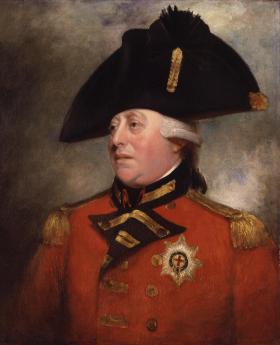
|
| King George III |
BECAUSE America had recently revolted to rid itself of King George III, the Constitutional framers of 1787 sought to construct a government forever free from one-man rule. Inefficiency could be accepted but central dictatorial power, never. It is unrealistic however to expect a wind-up toy to keep working forever, and our Constitution creates the same worry. After two centuries, some chinks have appeared.
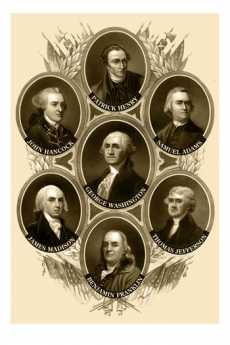
|
| Founding Fathers |
Political parties existed in 18th Century England and Europe, but the American founding fathers seem not to have worried about them much. Within ten years of Constitutional ratification, however, Thomas Jefferson had created a really partisan party which naturally provoked the creation of its partisan opposite. James Madison was slowly won over to the idea this was inevitable, but George Washington never budged. Although they were once firm friends, when Madison's partisan position became clear to him, Washington essentially never spoke to him again. Andrew Jackson, with the guidance of Martin van Buren, carried the partisan idea much further toward its modern characteristics, but it was the two Roosevelts who most fully tested the U.S. Supreme Court's tolerance for concentrating new powers in the Presidency, and Obama who recognized that the quickest way to strengthen the Presidency was to weaken the Legislative branch.
Dramatic episodes of this history are not central to present concerns, which focuses more on the largely unnoticed accumulations of small changes which bring us to our present position. Wars and economic crises induced several presidents, nearly as many Republicans as Democrats, to encourage migrations of power advantage which never quite returned to baseline after each crisis. Primary among these migrations was the erosion of the original assumption of perfect equality among individual members of Congress. A new member of Congress today may tell his constituents he will represent them ably, but when he arrives for work he is figuratively given an office in the basement and allowed to sit on empty packing cases. This is not accidental; the slights are intentional warnings from the true masters of power to bumptious new egotists, they will get nothing in their new environment unless they earn it. Not a bad idea? This schoolyard bullying is a very bad idea. If your elected representative is less powerful, you are less powerful.
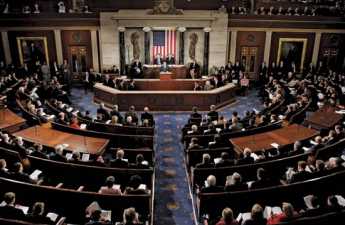
|
| Houses of Congress |
Partisan politics begins with vote-swapping, evolves into a system of concentrating the votes of the members into the hands of party leaders, and ultimately creates the potential for declaring betrayal if the member votes his own mind in defiance of the leader. The rules of the "body" are adopted within moments of the first opening gavel, but they took centuries to evolve and will only significantly change direction on those few occasions when newcomers overpower the old-timers, and only then if some rebel among the old timers takes the considerable trouble to help organize them. In the vast majority of cases, after adoption, the opportunity to change the rules is then effectively lost for two years. Even the Senate, with six-year staggered terms, has argued that it is a "continuing body" and need not reconsider its rules except in the face of a serious uprising on some particular point. Both houses of Congress place great weight on seniority, for the very good purpose of training unfamiliar newcomers in obscure topics, and for the very bad purpose of concentrating power in "safe" districts where party leaders are able to exercise iron control of the nominating process. Those invisible bosses back home in the district, able to control nominations in safe districts, are the real powers in Congress. They indirectly control the offices and chairmanships which accumulate seniority in Congress; anyone who desires to control Congress must control the local political bosses, few of whom ever stand for election to any office if they can avoid it. In most states, the number of safe districts is a function of controlling the gerrymandering process, which takes place every ten years after a census. Therefore, in most states, it is possible to predict the politics of the whole state for a decade, by merely knowing the outcome of the redistricting. The rules for selecting members of the redistricting committee in the state legislatures are quite arcane and almost unbelievably subtle. An inquiring newsman who tries to compile a fifty-state table of the redistricting rules would spend several months doing it, and miss the essential points in a significant number of cases. The newspapers who attempt to pry out the facts of gerrymandering are easily gulled into the misleading belief that a good district is one which is round and compact, leading to a front-page picture showing all districts to be the same physical size. In fact, a good district is one where both parties have a reasonable chance to win, depending for a change, on the quality of their nominee.
So that's how the "Will of Congress" is supposed to work, but the process recently has been far less commendable, and in fact, calls into dispute the whole idea of a balance of power between the three branches of government. We here concentrate on the Health Reform Bill ("Obamacare") and the Financial Reform Bill ("Dodd-Frank"), which send the same procedural message even though they differ widely in their central topic. At the moment, neither of these important pieces of legislation has been fully subject to judicial review, so the U.S. Supreme Court has not yet encumbered itself with stare decisis of its own creation.
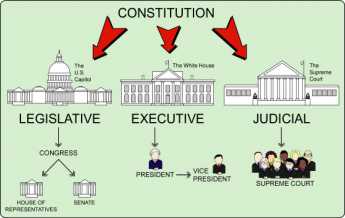
|
| Three branches of government |
In both cases, bills of several thousand pages each were first written by persons who if not unknown, are largely unidentified. It is thus not yet possible to determine whether the authors were affiliated with the Executive Branch or the Legislative one; it is not even possible to be sure they were either elected or appointed to their positions. From all appearances, however, they met and organized their work fairly exclusively within the oversight of the Executive Branch. Some weighty members of the majority party in Congress must have had some involvement, but it seems a near certainty that no members of the minority party were included, and even comparatively few members of highly contested districts, the so-called "Blue Dogs" of the majority party. It seems safe to conjecture that a substantial number either represent special interest affiliates or else party faithful from safe districts with seniority. The construction of the massive legislation was conducted in such secrecy that even the sympathetic members of the press were excluded, and it would not be surprising to learn that no person alive had read the whole bill carefully before it was "sent" to Congress. It's fair to surmise that no member of Congress except a few limited members of the power elite of the majority party were allowed to read more than scattered fragments of the pending legislation in time to make meaningful changes.
The next step was probably more carefully managed. No matter who wrote it or what it said, a majority of the relevant committees of both houses of Congress had to sign their names as responsible for approving it. Because of the relatively new phenomenon of live national televising of committee procedure, the nation was treated to the sight of congressmen of both parties howling that they were only given a single day to read several thousand pages of previously secret material -- before being forced to sign approval of it by application of unmentioned pressures enabled by the rules of "the body". When party members in contested districts protested that they would be dis-elected for doing so, it does not take much imagination to surmise that they were offered various appointive offices within the bureaucracy as a consolation. As it turned out, the legislation was only passed narrowly on a straight-party vote, so there can be a considerable possibility of its likely failure if the corruptions of politics had been set aside, with members voting on the merits. Nevertheless, since this degree of political hammering did result in a straight-party vote, it leaves the minority party free to overturn the legislation when it can. The prospect of preventing an overturn in succeeding congresses seems to be premised on "fixing" flaws in the legislation through the issuance of regulations before elections can open the way to overturn of the underlying authorization. Legislative overturn, however, is very likely to encounter filibuster in the Senate, which presently requires 40 votes. Even that conventional pathway is booby-trapped in the case of the Dodd-Frank Law. The Economist magazine of London assigned a reporter to read the entire act, and relates that almost every page of it mandates that the Executive Branch ("The Secretary shall") must take rather vague instructions to write regulations five or ten times as long as the Congressional authorization, giving the specifics of the law. The prospect looms of vast numbers of regulations with the force of law but written by the executive branch, emerging long after the Supreme Court considers the central points, years after the authorizing congressmen have had a chance to read it, and well after the public has rendered final judgment with a presidential election. The underlying principle of this legislation is the hope that it will later seem too disruptive to change a law, even though most of it was never considered by the public or its representatives.
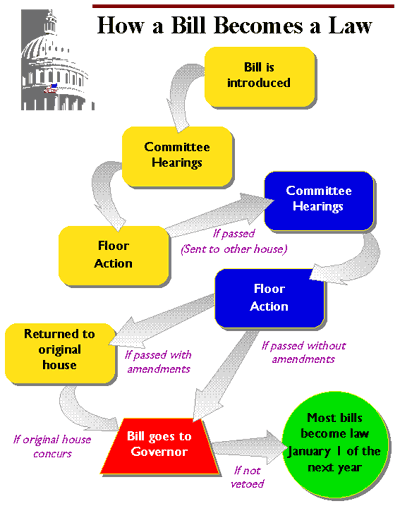
|
| Bill become a Law |
The "regulatory process" takes place entirely within the Executive branch. Congress passes what it terms "enabling" legislation, containing language to the effect that the Cabinet Secretary shall investigate as needed, decide as needed, and implement as needed, such regulations as shall be needed to carry out the "Will" of Congress. Since the regulations for two-thousand-page bills will almost certainly run to twenty thousand pages of regulations with the force of law, the enabling committee of Congress will be confronted with an impossible task of oversight, and thus will offer few objections. The Appropriations Committees of Congress, on the other hand, are charged with reviewing every government program every year and have the power to throttle what they disapprove of, by the simple mechanism of cutting off the program's funds. Members of the coveted Appropriations Committees are appointed by seniority, come from safe districts, and are attracted to the work by the associated ability to bestow plums on their home districts. By the nature of their appointment process, unworried by the folks back home but entirely beholden to the party bosses, they have the latitude to throttle anything the leadership of their party wants to throttle badly enough. The outcome of such take-no-prisoners warfare is not likely to improve the welfare of the nation, and therefore it is rare that partisan politics are allowed to go so far.
The three branches of government have become unbalanced. These bills were almost entirely written outside of the Legislative branch, and the ensuing regulations will be written in the Executive branch. The founding fathers certainly never envisioned that sweeping modification will be made in the medical industry and the financial industry, against the wishes of these industries, and in any event without convincing proof that the public is in favor. This is what is fundamentally wrong about taking such important decisions out of the hands of Congress; it threatens to put the public at odds with its government.
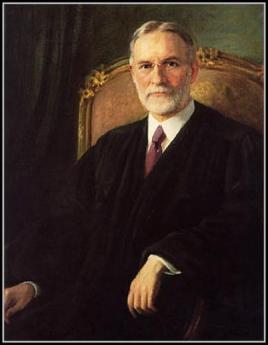
|
| Justice George Sutherland |
There is no need to go further than this, harsher words will only inflame the reaction further than necessary to justify a pull-back. And yet, the Supreme Court would do us mercy if it doused these flames; the Supreme Court needs a legal pretext. May we suggest that Justice George Sutherland, who sat on the court seventy years ago, may have sensed the direction of things, short of using a particular word. Justice Sutherland recognized that although it is impractical to waver from the principle that ignorance of the law is no excuse, it is entirely possible for a person of ordinary understanding to read law in its entirety and still be confused as to its intent. He thus created a legal principle that a law may be void if it is too vague to be understood. In particular, a common criminal may be even less able to make a serious analysis. Therefore, at least in criminal cases, a lawyer may well be void for vagueness. In this case, we are not speaking of criminals as defendants or civil cases of alleged damage of one party by a defendant. Here, it is the law itself which gives offense by its vagueness, and Congress which created the vagueness is the defendant. Since we have just gone to considerable length to describe the manner in which Congress is possibly the main victim, this situation may be one of the few remaining ones where a Court of Equity is needed. That is, an obvious wrong needs to be corrected, but no statute seems to cover the matter. The Supreme Court might give some thought to convening itself as a special Court of Equity, on the special point of whether this legislation is void for vagueness.
We indicated earlier that one word was missing in this bill of particulars. That would be needed, to expand the charge to void for intentional vagueness, an assessment which is unflinchingly direct. It suggests that somewhere in at least this year's contentious processes, either the Executive Branch or the officers of the congressional majority party, or both, intended to achieve the latitude of imprecision, that is, to do as it pleased. Anyone who supposes the general run of congressmen voluntarily surrendered such latitude in the Health and Finance legislation, has not been watching much television. Given the present vast quantity of annually proposed legislation, roughly 25,000 bills each session, the passage of a small amount of vague legislation might only justify voiding individual laws, whereas an undue amount of it might additionally justify a reprimand. However, engineering laws which are deliberately vague might rise to the level of impeachment.
Franklin Teaches Investing to Boston and Philadelphia
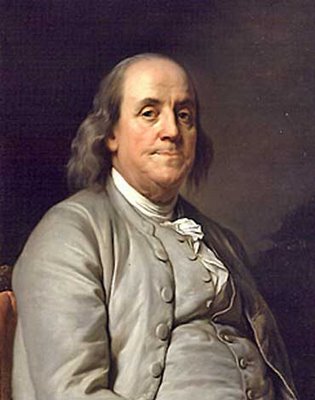
|
| Benjamin Franklin |
CODICIL: I, Benjamin Franklin, in the foregoing or annexed last will and testament named, having further considered the same, do think proper to make and publish the following codicil or addition thereto.
It has long been a fixed political opinion of mine, that in a democratical state there ought to be no offices of profit, for the reasons I had given in an article of my drawing in our constitution, it was my intention when I accepted the office of President, to devote the appointed salary to some public uses. Accordingly, I had already, before I made my will in July last, given large sums of it to colleges, schools, the building of churches, etc.; and in that will I bequeathed two thousand pounds more to the State for the purpose of making the Schuylkill navigable. But understanding since that such a work, and that the project is not likely to be undertaken for many years to come, and having entertained another idea, that I hope may be more extensively useful, I do hereby revoke and annul that bequest, and direct that the certificates I have for what remains due to me of that salary be sold, towards raising the sum of two thousand pounds sterling, to be disposed of as I am now about to order.
It has been an opinion, that he who receives an estate from his ancestors is under some kind of obligation to transmit the same to their posterity. This obligation does not lie on me, who never inherited a shilling from an ancestor or relation. I shall, however, if it is not diminished by some accident before my death, leave a considerable estate among my descendants and relations. The above observation is made as merely as some apology to my family for making bequests that do not appear to have any immediate relation to their advantage.
I was born in Boston, New England, and owe my first instructions in literature to the free grammar schools established there. I have, therefore, already considered these schools in my will. But I am also under obligations to the State of Massachusetts for having, unasked, appointed me formerly their agent in England, with a handsome salary, which continued some years; and although I accidentally lost in their service, by transmitting Governor Hutchinson's letters, much more than the amount of what they gave me, I do not think that ought in the least to diminish my gratitude.
I have considered that, among artisans, good apprentices are most likely to make good citizens, and, having myself been bred to a manual art, printing, in my native town, and afterward assisted to set up my business in Philadelphia by kind loans of money from two friends there, which was the foundation of my fortune, and all the utility in life that may be ascribed to me, I wish to be useful even after my death, if possible, in forming and advancing other young men, that may be serviceable to their country in both these towns. To this end, I devote two thousand pounds sterling, of which I give one thousand thereof to the inhabitants of the town of Boston, in Massachusetts, and the other thousand to the inhabitants of the city of Philadelphia, in trust, to and for the uses, intents, and purposes hereinafter mentioned and declared.
The said sum of one thousand pounds sterling, if accepted by the inhabitants of the town of Boston, shall be managed under the direction of the selectmen, united with the ministers of the oldest Episcopalians, Congregational, and Presbyterian churches in that town, who are to let out the sum upon interest, at five per cent, per annum, to such young married artificers, under the age of twenty-five years, as have served an apprenticeship in the said town, and faithfully fulfilled the duties required in their indentures, so as to obtain a good moral character from at least two respectable citizens, who are willing to become their sureties, in a bond with the applicants, for the repayment of the moneys so lent, with interest, according to the terms hereinafter prescribed; all which bonds are to be taken for Spanish milled dollars, or the value thereof in current gold coin; and the managers shall keep a bound book or books, wherein shall be entered the names of those who shall apply for and receive the benefits of this institution, and of their sureties, together with the sums lent, the dates, and other necessary and proper records respecting the business and concerns of this institution. And as these loans are intended to assist young married artificers in setting up their business, they are to be proportioned by the discretion of the managers, so as not to exceed sixty pounds sterling to one person, nor to be less than fifteen pounds; and if the number of appliers so entitled should be so large as that the sum will not suffice to afford to each as much as might otherwise not be improper, the proportion to each shall be diminished so as to afford to everyone some assistance. These aids may, therefore, be small at first, but, as the capital increases by the accumulated interest, they will be ampler. And in order to serve as many as possible in their turn, as well as to make the repayment of the principal borrowed easier, each borrower shall be obliged to pay, with the yearly interest, one-tenth part of the principal and interest, so paid in, shall be again let out to fresh borrowers.
And, as it is presumed that there will always be found in Boston virtuous and benevolent citizens, willing to bestow a part of their time in doing good to the rising generation, by superintending and managing this institution gratis, it is hoped that no part of the money will at any time be dead, or be diverted to other purposes, but be continually augmenting by the interest; in which case there may, in time, be more than the occasions in Boston shall require, and then some may be spared to the neighboring or other towns in the said State of Massachusetts, who may desire to have it; such towns engaging to pay punctually the interest and the portions of the principal, annually, to the inhabitants of the town of Boston.
If this plan is executed, and succeeds as projected without interruption for one hundred years, the sum will then be one hundred and thirty-one thousand pounds; of which I would have the managers of the donation to the town of Boston then lay out, at their discretion, one hundred thousand pounds in public works, which may be judged of most general utility to the inhabitants, such as fortifications, bridges, aqueducts, public buildings, baths, pavements, or whatever may make living in the town more convenient to its people, and render it more agreeable to strangers resorting thither for health or a temporary residence. The remaining thirty-one thousand pounds I would have continued to be let out on interest, in the manner above directed, for another hundred years, as I hope it will have been found that the institution has had a good effect on the conduct of youth, and been of service to many worthy characters and useful citizens. At the end of this second term, if no unfortunate accident has prevented the operation, the sum will be four million and sixty-one thousand pounds sterling, of which I leave one million sixty-one thousand pounds to the disposition of the inhabitants of the town of Boston, and three millions to the disposition of the government of the state, not presuming to carry my views farther.
All the directions herein given, respecting the disposition and management of the donation to the inhabitants of Boston, I would have observed respecting that to the inhabitants of Philadelphia, only, as Philadelphia is incorporated, I request the corporation of that city to undertake the management agreeably to the said directions; and I do hereby vest them with full and ample powers for that purpose. And, having considered that the covering a ground plot with buildings and pavements, which carry off most of the rain and prevent its soaking into the Earth and renewing and purifying the Springs, whence the water of wells must gradually grow worse, and in time be unfit for use, as I find has happened in all old cities, I recommend that at the end of the first hundred years, if not done before, the corporation of the city Employ a part of the hundred thousand pounds in bringing, by pipes, the water of Wissahickon Creek into the town, so as to supply the inhabitants, which I apprehend may be done without great difficulty, the level of the creek is much above that of the city, and may be made higher by a dam. I also recommend making the Schuylkill completely navigable. At the end of the second hundred years, I would have the disposition of the four million and sixty-one thousand pounds divided between the inhabitants of the city of Philadelphia and the government of Pennsylvania, in the same manner as herein directed with respect to that of the inhabitants of Boston and the government of Massachusetts.
It is my desire that this institution should take place and begin to operate within one year after my decease, for which purpose due notice should be publicly given previous to the expiration of that year, that those for whose benefit this establishment is intended may make their respective applications. And I hereby direct my executors, the survivors or survivor of them, within six months after my decease, to pay over the sum of two thousand pounds sterling to such persons as shall be duly appointed by the Selectmen of Boston and the corporation of Philadelphia, to receive and take charge of their respective sums, of one thousand pounds each, for the purposes aforesaid.
Considering the accidents to which all human affairs and projects are subject in such a length of time, I have, perhaps, too much flattered myself with a vain fancy that these dispositions, if carried into execution, will be continued without interruption and have the effects proposed. I hope, however, that if the inhabitants of the two cities should not think fit to undertake the execution, they will, at least, accept the offer of these donations as a mark of my good will, a token of my gratitude, and a testimony of my earnest desire to be useful to them after my departure.
I wish, indeed, that they may both undertake to endeavor the execution of the project, because I think that, though unforeseen difficulties may arise, expedients will be found to remove them, and the scheme be found practicable. If one of them accepts the money, with the conditions, and the other refuses, my will then is, that both Sums be given to the inhabitants of the city accepting the whole, to be applied to the same purposes, and under the same regulations directed for the separate parts; and, if both refuse, the money, of course, remains in the mass of my Estate, and is to be disposed of therewith according to my will made the Seventeenth day of July, 1788.
..........................................................And lastly, it is my desire that this, my present codicil, be annexed to, and considered as part of, my last will and testament to all intents and purposes.
In witness whereof, I have hereunto set my hand and Seal this twenty-third day of June, Anno Domini one thousand Seven hundred and eighty-nine.
B. Franklin.
Sad Aftermath
Extracted from a printed Report of the Committee of Legacies and Trusts, made in the Common Council of Philadelphia April 27th, 1837, by Mr. John Thomason, chairman of the Committee.
"From official returns, it appears, that up to the 1st of January, 1837, the fund has been borrowed by one hundred and ninety-three individuals, in sums mostly of $ 260 each. At that date, the fund was in the hands of one hundred and twelve beneficiaries, of whom nineteen have paid neither principal nor interest, although the accounts of some of them have been open for a period of thirty-four years. Ninety other persons stand indebted in sums from $ 21 to $ 292; and three, having borrowed within the year, were not, at the last-mentioned date, liable to any demand by the trustees. Of these one hundred and nine cases of non-compliance with the terms of the will, fifty-eight bonds may be subject to a plea of the statute of limitation, and the rest is still valid. In this condition of the fund, it becomes difficult to estimate its present value. Should all the debts be recovered, the amount of the fund would be $ 23,627.09; but, from the length of time elapsed since the date of many of those bonds, such a result is hopeless; and even this latter sum, large as it is, is below the amount it would have attained at this time had the intentions of the testator been fully carried out. The original bequest of $4,444.44, at compound interest for forty-five years, would be $ 39,833.29 ; and, although the immediate conversion of interest into principal, as the former becomes due, is not always practical, yet it is believed, that, with careful management, the fund would, at this time, have lacked but little of that amount. How far the fund falls short, may be partly judged from the actual receipts on account of this legacy for the last ten years. During that time the sum of $ 16,191.92 has been paid in. As this period included the term for lending out, and receiving back with interest, the whole fund, the receipts within that term may be taken as a safe approximation to its real value; to which must be added the sum to be obtained through the enforcing of payment, by legal process, from such securities as may be good at this late day. Had the fund been placed at simple interest, it would have amounted to the last-mentioned sum by this time.
"Had the requirements of the will been, in former years, fully complied with, the operation of the fund, at this day, would be sensibly felt by the mechanics of Philadelphia. Passing from one borrower to another, and increasing in a compound ratio, its effect would be to stimulate useful industry, which, without such capital, would have remained unproductive. It would have increased the number of those who do business on their own stock. It would be a standing lesson on the immutable connexion between capital and productive industry, thus constantly inciting to economy and prudence. It would have become the reward of every faithful apprentice, who could look forward to a participation in its benefit. It is deeply to be regretted, that this state of things, which had so captivated the imagination of Franklin that he devoted a portion of his hard-earned wealth to realize it for the mechanics of Philadelphia, should, in the emphatic language of his will, prove 'a vain fancy. ' "
By this statement it would seem, that there had been at some time a remarkable want of fidelity in administering the trust, especially in allowing so large a number of bonds to become worthless by the statute of limitation, and neglecting to make reasonable- demands upon the sureties.
Appended to the same report is a letter from Mr. William Minot, treasurer of the Franklin Fund in Boston, dated December 23d, 1836, which contains the following state, of the fund in that city.
"The whole number of loans from this Fund," Mr. Minot says, " from May 1791 to the present time, has been 255, in sums varying from 70 to $ 266 up to the year 1800, since which time they have usually been 200.
"From July, 1811, to the present time, the number of loans has been 91, of which 50, at least have been repaid (in whole or in part) by sureties, and on four of these are balances which cannot be collected, both principals and sureties being insolvent.
" Dr. Franklin's donation was Pound 1,000 sterling. The present value of the Fund is as follows;
"Estimate of 13 bonds, considered good, 1,428.68 "Amount deposited, on interest, in the office of the Massachusetts Hospital Life Insurance Company, 22,739.00 Cash in the hands of the Treasurer 158.15
$24,325.83
"It is apparent, from these facts, that the benevolent intentions of the donor have not been realized, and that, in the present condition of our country, it is not advantageous to married mechanics, under the age of twenty-four years, to borrow money to be repaid in easy installments, at a low rate of interest; and the improvidence of early marriages, among that class of men, may fairly be inferred.
"The great number of instances, in which sureties have been obliged to pay the loans, has rendered it not so easy, as formerly, for applicants to obtain the required security. This is proved by the small number of loans from the fund, averaging for the last five years, not more than one a year.
"Until within the last twenty years, no great care was taken in accumulating the fund. It is now carefully attended to; and money not required for actual use is placed in the Life Insurance Company, where it increases at the rate of about five and one-third percent a year.
"The loans are made at the rate of five percent, but, on installments past due, six percent is charged, from the time they were payable, and the bonds of delinquents are put in a suit after reasonable notice. Two sureties, at least, are required on each bond."
According to the treasurer's return on a lot of January 1840, the amount of the fund in Boston was at that time as follows.
Deposited in the Life Insurance office, 26,595.64
Bonds for Loans 1,846.35 $28,441.99
Net Neutrality and Vertical Integration

|
| Late Hour Calls |
My fancy new cell phone has an annoying habit of ringing a bell every time an e-mail arrives, which is a little puzzling when it rings in the middle of the night. The email program displays time of arrival, so after a while, I took the trouble to see who was emailing me at 4 AM. It seems to be spam and other commercial programs, but it is also an occasional letter with a large attachment, which had been sent several hours earlier. At this, a light began to go on in my head.
I had been told the internet measures the size of files and puts big ones at the end of the queue. That seemed to explain the occasionally delayed transmission of ultra-large emails at times of heavy internet traffic. And it brings up the issue of net neutrality. If the traffic in large files grows enough, it might eventually clog the wires and bring things to a halt. The internet providers would have to spend money to build additional capacity, and it only seems fair to charge big users more for the costs they have created. That would seem a reasonable technological argument for allowing the networks to impose differential pricing, and for overturning the idea of net neutrality.

|
| Comcast and NBC |
Unfortunately, it might or might not be a sincere argument for resisting net neutrality, since there are major commercial issues at stake as well. For example, Comcast is trying to purchase NBC; its motives are clarified by remembering that a few years ago it tried to purchase Walt Disney. In both cases, a common carrier would be acquiring a "content provider", and thus acquiring a competitive advantage over competitive internet network providers who lack a captive source of content. A strong temptation would exist to slant the internet charges to the disadvantage of other competitors, thus providing a motive to get involved in insincere arguments about net neutrality. What we seem to have here is a familiar antitrust legal doctrine of "vertical integration". For years, vertical integration was prohibited, but the U.S. Supreme Court reversed that prohibition a few years ago, in the case of State Oil v. Kahn. Lewis van Dusen and I had been in the audience of the State Oil arguments, because of our interest in the implications of vertical integration for the medical profession (doctors versus hospitals, for example).
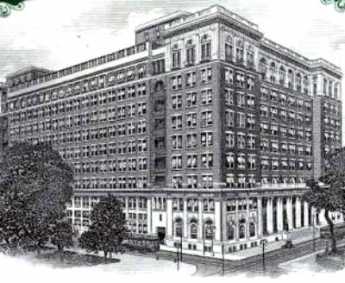
|
| Curtis Publishing |
Although the example of Curtis Publishing was not introduced into the arguments of State Oil versus Kahn, it was much in my mind and might well have been used effectively to demonstrate the vulnerability of any corporation which attempts to become vertically integrated by purchasing its suppliers and/or distributors. Curtis Publishing, a few blocks from my office, had been a successful magazine publisher, so successful that it had enough profits to buy Canadian forests to use for paper pulp in its magazines. The outcome was the bankruptcy of the profitable magazine company when the paper pulp business fell on hard times. No antitrust action to prohibit vertical integration was necessary; the dismal fate of Curtis and similar integrators stood as an effective restraint on anyone else who was tempted to get into the vertical integration business. That may be a little hard to follow, and it took the Supreme Court many years to get to that point. But the fact remains that vertical integration is no longer illegal because it is effectively restrained by recognition of its dangers.
So, if we are getting into the insincere argument business, it is time for someone to put his arm around the shoulders of Comcast. Let's whisper that avoidance of the net neutrality dispute is kindly advice, offered solely for Comcast's own good.

|
| Comcast Center |
And, having gone this far in poking into other people's business, there might be some value in giving some advice to the antitrust lawyers. This sort of case can take years, even decades, to evolve through the legal system. And while its resolution will be phrased in legal terms, I'm not so sure that's sincere, either. It takes me back to the IBM case, where one of the junior lawyers was courting one of my daughters. This young fellow sat for months in front of a microphone at a deposition, doing nothing but read documents into the record. Although he was handsomely paid, the lawyer finally got so sick of the boring futility of dictating a mountain of transcript no one would ever read, into a microphone in an empty room, that he quit. And in the opinion of observers on the courthouse steps, the case was finally determined by the Judge's decision that the patent infringement business was trivial compared with the fact that IBM was mass-producing the greatest innovation of the century -- and the patent-infringement people were just getting in the road.
That may or may not have been the case, but it raises the question of whether antitrust law is wisely based when it considers, not the welfare of competitors, but the strength and vitality of competition itself. What might thus be considered paramount, and perhaps occasionally is so, is the economic welfare of the nation. At present, the newspapers regard this issue as a fight between Netflix and Comcast, and so are now free to devote news attention to other matters. I don't think so. I believe it directly challenges the operation of the Law, which contends that vertical integration eventually takes care of itself. To me, that is only true if circumstances give us enough time to wait it out. In the long run, as Maynard Keynes quipped, we are all dead.
Do Computers Thrive on Lead Poisoning?

|
| Get the Lead Out |
At a local outlet of a well-known chain of computer stores, the geek told me that small computer towers don't last as long as big-box desktops, perhaps only three years compared with the old five-year lifespan. And that's because they get hotter. Which is because they run faster than they used to, and also because a federal regulation prohibiting the use of lead in soldering joints makes the wiring wear out sooner. By the time he was done explaining things to me, I was ready to run out and join the local political Tea Party. Because I don't think it's very likely that toddler children will be eating my solder very soon, or even ever. And indeed, I have trouble imagining any children anywhere in the world ever nibbling on computer innards, even once. Maybe the concern is that the heat will vaporize the lead, and little children crawling on the floor will inhale the lead vapor, getting lead poisoning that way. While that may be somewhat more plausible than eating computer parts, or eating vegetables grown in the neighborhood of trash disposal, or breathing the air full of lead fumes -- it doesn't really seem very plausible at all.
It is generally reckoned that 835 million computers worldwide were manufactured in 2010. If they cost an average of $500 apiece and lasted 40% less long than if they used lead solder, the world would end up buying 300 million additional computers per year, conservatively spending $1.5 billion more dollars a year to do so. Are the dangers of lead poisoning so threatening that such a cost is justified on a hypothetical basis? The people who do the soldering are possibly at somewhat greater risk, but you could buy a lot of masks and air purifiers for the extra cost for computers alone. Can this possibly be true?
Is it possible that the geek in the computer store is just selling warranty insurance, or more expensive computers when he passes on this news? Is it possible that the makers of fumes ventilators are promoting their products in this way? How about the plaintiff trial lawyers. Are they calculating that frenzied citizens will wander into jury duty and be concerned to punish the evil makers of computers with gigantic penalties, of which the lawyers will get 40%? Or the makers of cool computer boxes are competing indirectly with the evil makers of hot computer boxes?
This article ends with a comment section. Those who can offer references to the facts, in this case, are urged to send them in. Something in this story doesn't stand the light of day, and perhaps a way can be found to shine a little light of day on the facts.
Adrift With The Living Constitution
.jpg)
|
| Senator Joe Sestak |
Former Congressman Joe Sestak visited the Franklin Inn Club recently, describing his experiences with the Tea Party movement. Since Senator Patrick Toomey, the man who defeated him in the 2010 election, is mostly a Libertarian, and Senator Arlen Specter who also lost has switched parties twice, all three candidates in the Pennsylvania senatorial election displayed major independence from party dominance, although in different ways. Ordinarily, gerrymandering and political machine politics result in a great many "safe" seats, where a representative or a Senator has more to fear from rivals in his own party than from his opposition in the other party; this year, things seem to be changing in our area. Pennsylvania is somehow in the vanguard of a major national shift in party politics, although it is unclear whether a third party is about to emerge, or whether the nature of the two party system is about to change in some other way.
For his part, Joe Sestak (formerly D. Representative from Delaware County) had won the Democratic senatorial nomination against the wishes of the party leaders, who had previously promised the nomination to incumbent Senator Specter in reward for Specter's switching from the Republican to Democratic party. For Vice-Admiral Sestak, USN (Ret.) it naturally stings a little that he won the nomination without leadership support, but still came reasonably close to winning the general election without much enthusiasm within his party. He clearly believes he would have beaten Toomey if the party leaders had supported him. It rather looks as though the Democratic party leadership would rather lose the election to the Republicans than lose control of nominations, which are their real source of power. Controlling nominations is largely a process of persuading unwelcome contenders to drop out of the contest. Sestak is, therefore, making a large number of thank-you visits after the election, and clearly has his ears open for signs of what the wandering electorate might think of his future candidacy.
America clearly prefers a two-party system to both the dictatorial tendencies of a one-party system, as well as to European multi-party arrangements, such as run-offs or coalitions. A two-party system blunts the edges of extreme partisanship, eventually moving toward moderate candidates in the middle, in order to win a winner-take-all election. Therefore, our winner-take-all rules are the enforcement mechanism for a two-party system. Our deals and bargains are made in advance of the election, where the public can express an opinion. In multi-party systems, the deals are made after the election where the public can't see what's going on, and such arrangements are historically unstable, sometimes resulting in a victory by a minority fringe with violently unpopular policies. In our system, a new third-party mainly serves as a mechanism for breaking up one of the major parties, to reformulate it as a two-party system with different composition. Proportional representation is defended by European politicians as something which promotes "fairness". Unfortunately, it's pretty hard to find anything in politics anywhere which is sincerely devoted to fairness.
Going far back in history one of the great theorists of legislative politics was the Roman Senator Pliny the Younger, who wrote books in Latin about how to manipulate a voting system. For him, parties were only temporary working arrangements about individual issues, a situation where he recommended: "insincere voting" as a method for winning a vote even if you lacked a majority in favor of it. Over the centuries, other forms of party coalitions have emerged in nations attempting to make democracy workable. Indeed, a "republic" itself can be seen as a mechanism devised for retaining popular control in an electorate grown too large for the chaos and unworkability of pure town hall democracy. A republic is a democracy which has been somewhat modified to make it workable. Our founding fathers knew this from personal experience, and never really considered pure democracy even in the Eighteenth century.
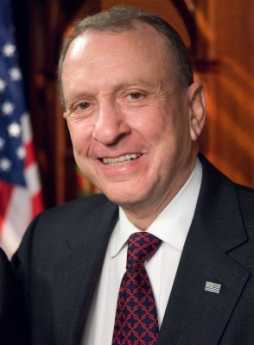
|
| Senator Specter |
The two main actors in shaping the American Republic were George Washington and James Madison. Madison was young, scholarly and largely unknown; Washington was old, famous, and insecure about his lack of academic political education. Both of them knew very well that if Washington really wanted something he was going to have it; what mainly restrained him was fear of looking foolish. But he hated partisanship and conniving, partly as a result of having been the victim of General Mifflin and the Conway Cabal. Washington hated political parties and anything resembling them; Madison was young and uncertain, and briefly surrendered the point. It took about two years of real-life governing for Madison to conclude that political parties were absolutely essential to getting something accomplished. In this, he experienced for the first time those unwelcome "pressures from the home state", with Thomas Jefferson determined to thwart Alexander Hamilton, and Patrick Henry thundering and denouncing any hesitation in going for the jugular vein of opponents. Madison was deeply concerned with making his new nation success and eventually joined Jefferson in the Virginia policy of opposing banks, cities and manufacturing. When Washington saw that Madison was committed to this course, he never spoke to him again. For Washington, honesty was always the best policy, and personal honor is never regained once it is lost. The compromise of 1790 was particularly vexing to their relationship, when Washington's honor and personal finances were used as bargaining chips for moving the nation's capital opposite Mount Vernon on the Potomac River, in return for placating Hamilton and Robert Morris with the assumption of state revolutionary war debts.
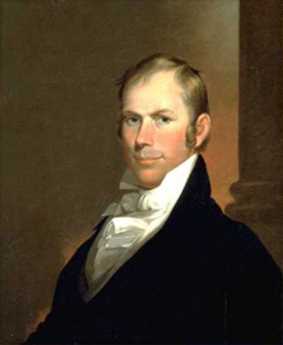
|
| Henry Clay 1811 |
Legislative partisan politics took a violent turn in 1811 when 34-year old Henry Clay was elected to his first term as a member of the House of Representatives. The Senate was less prestigious than the House in those days, and Clay had spent his time as a senator studying the landscape of the House before he made his big move upward. Up until that moment, the role of Speaker was that of mediator and administrator of the rules, partisanship was considered a shameful thing in a Speaker. Young Clay was elected Speaker on the first day of the first session after he moved to the House as a member. Seniority was brushed aside, and this newcomer took over. It takes only a moment's reflection to surmise that a lot of politics had taken place before the House convened. Not only that, but Clay immediately added the power of the Speaker to appoint committee chairmen, to the invisible powers of majority leader. The office of majority leader had not yet been created, but it was not long in emerging that anyone who could assemble enough votes for Speaker was also able to make highly partisan choices for Committee Chairs. Eventually, the seniority system was imposed in part as a reaction to perceived abuses of Speaker power. It is worth a digression to reflect on the role of any seniority system, which as it is clearly seen in labor-management industrial relations, serves to deprive management of promotion power, usually substituting seniority for selection by merit. In the case of the Speaker, the seniority system catapults the power of the Speaker over that of every member of his caucus. To rise in a seniority system for committee chairmen, a member must first be appointed to a desirable committee -- by the Speaker, or by his instructed favorites on the appointment committee. It puts in the hands of the Speaker or his agents the power to humiliate a member by ignoring his seniority; the other members know immediately what that means. To understand the power of this threat, reflect on Woodrow Wilson's famous observation that "Congress in committee, is Congress at work."
Soon after Henry Clay made his dramatic moves, Martin van Buren extended the idea of partisan party politics to the actual election of Congressmen. Much of the hoopla and deceptiveness of subsequent campaigns was invented by Andrew Jackson's vice president. And that included their own deal, in which van Buren worked for Jackson's election in return for a promise that he would be the successor, President. After that came the election of 1848, in which William Henry Harrison was elected as a man born in a log cabin. When, in fact, he had been born in one of the largest mansions in Virginia. That had been approximately George Washington's residence description, too, but it is hard to see Old Stone Face lowering himself to accept any office unless it was offered unanimously.
Compare that with the campaign financing episode which created the urban political machine. The Philadelphia traction king Wm. L. Elkins was narrowly concerned with building streetcar lines along with his business associate P.A.B. Widener; Widener had been a city politician before he got into street cars. One or the other of these two approached the Mayor of Philadelphia with the complaint that it interfered with building streetcar lines to have to bribe every bartender on every street corner. So he made a proposal. It wasn't the money that bothered him, because he could just raise trolley fares to cover it, it was the protracted delays. So, how would it be if the trolley company just delivered a big lump-sum bribe to the mayor? That would give enormous political power to the party boss through the power to distribute or withhold the boodle to party workers. And it would save the trolley company lots of time, while not costing any more than the "retail graft" system. Since then, just about every urban political machine in the country has been largely financed through the macing of utilities.
The downward trend of serial modifications to the Philadelphia Constitution of 1787, should be clear enough without further illustration. If the Tea Parties aren't mad about it, they should be. More likely, however, they are mainly mad about the modern pinnacle of sly tinkerings, plainly displayed on TV during the enactment of the Obama Health Bill. The point was repeated for emphasis in the Dodd-Frank financial bill, in case it is ever claimed to have been accidental. In both cases, 2000 page bills were prepared out of sight and thrust before the Congress with orders to enact them in four hours. If that's a representative government, perhaps we ought to go back to having a King.
Fort Wilson: Philadelphia 1779
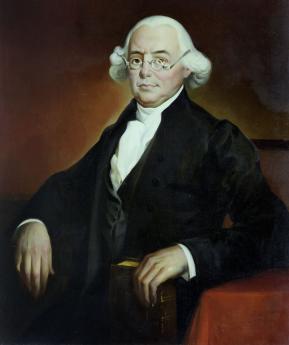
|
| James Wilson |
OCTOBER 4, 1779. The British had conquered then abandoned Philadelphia; an order was still only partially restored. Joseph Reed was President of the Continental Congress, inflation ("Not worth a Continental") was rampant, and food shortages were at near-famine levels because of self-defeating price controls. In a world turned upside down, Charles Willson Peale the painter was a leader of a radical group of admirers of Rousseau the French anarchist, called the Constitutionalist Party, leaning in the bloody direction actually followed by the French Revolution in 1789. Peale was quick to admit he had no clue what to do with his leadership position and soon resigned it in favor of painting portraits of the wealthy. Others had deserted the occupied city, and many had not yet returned. The Quakers of the city hunkered down, more or less adhering to earlier instruction from the London Yearly Meeting to stay away from any politics involving war taxes. About two hundred militia roamed the city streets making trouble for anyone they could plausibly blame for the breakdown of civil order. Philadelphia was as close to anarchy as it would ever become; the focus of anger was against the pacifist Quakers, the rich merchants, and James Wilson the lawyer.
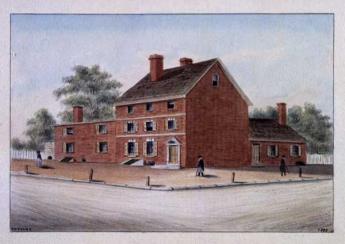
|
| Fort Wilson |
Wilson had enraged the radicals by defending Tories in court, much as John Adams got in trouble for defending British troops involved in the Boston Massacre; Ben Franklin advised Wilson to leave town. It is still possible to walk the full extent of the battle of Fort Wilson in a few minutes, and the tourist bureau has marked it out. Begin with the Quaker Meeting at Fourth and Arch. A few wandering militiamen caught Jonathan Drinker, Thomas Story, Buckridge Sims, and Matthew Johns emerging from the Quaker church, and rounded them up as prisoners. The Quakers were marched down the street for uncertain purposes when the militia encountered a group of prominent merchants emerging from the City Tavern. Unlike the meek Quakers, Robert Morris and John Cadwalader the leader of the City Troop ordered the militia to release the prisoners, behave themselves, and disperse; Timothy Matlack shouted orders. It was exactly the wrong stance to take, and about thirty prominent citizens were soon driven to retreat to the large brick house of James Wilson, at the corner of Third and Walnut, known forever afterward as Fort Wilson. Doors were barred, windows manned, and Fort Wilson was soon surrounded by an armed, shouting, mob. Lieutenant Robert Campbell leaned out a third story window and was soon dropped dead by a lucky bullet. It remains in dispute whether or not he fired first. Crowbars were sought, the back door forced open, but the angry attackers scattered after fusillades from inside.
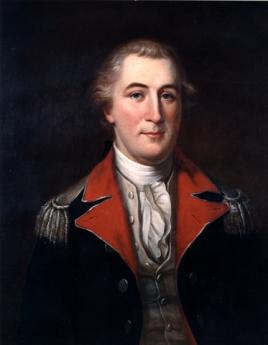
|
| Joseph Reed |
Down the street came President Reed on horseback, ordering the militia to disperse, with Timothy Matlack at his side; both men were well-known radicals, here switching sides to maintain law and order. The City Troop arrived, an order was given the cavalry to Assault Every Armed Man. The radicals were finally dispersed by this makeshift cavalry charge, cutting and slashing its way through the dazed militia. When it was over, five defenders were dead and about twenty wounded. Among the militia, the casualties were heavier but inaccurately reported. Robert Morris took James Wilson in hand and retreated to his mansion at Lemon Hill; Wilson was the founder of America's first law school. Among other defenders huddled in Fort Wilson were some of the future framers of the Constitution from Pennsylvania: General Thomas Mifflin, Wilson, Morris, George Clymer. Equally important was the deep impression left on radical leaders like Reed and Matlack, and Henry Laurens, who could see how close the whole war effort was to dissolution, for lack of firm control. Inflation continued but the center-productive price control system was abandoned and never revived; the Patriots had a bad scare, and the heedless radicals forced to confront the potentially disastrous consequences of their own amateur performance when entrusted with the power and responsibility they had just been demanding. It was one of those rare moments in a nation's history when the way suddenly opens to previously unthinkable actions.
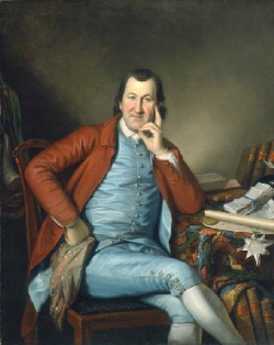
|
| Timothy Matlack |
The Battle of Fort Wilson was the only Revolutionary War battle fought within Philadelphia city limits; a revolution within a revolution, every participant was a Rebel patriot. Reed and Matlack were the two most visibly appalled by the whole uproar, forced by circumstances to attack the forces of their own political persuasion. But it seems very certain that Robert Morris and the other prosperous idealists were also left with an indelible conviction that even a confederation must maintain central command and discipline with an iron will, or all might be lost. A knowledgable French observer estimated that Robert Morris then owned assets worth eight million dollars, an almost unimaginable sum for the time. But he would lose every penny if effective political control could not be restored. A few days later in the October election, he and all the other Republican (conservative) officials lost their seats. It did not matter; Morris then knew what to do, and his opposition didn't.
Robert Morris: Businessman Father of the Bureaucracy
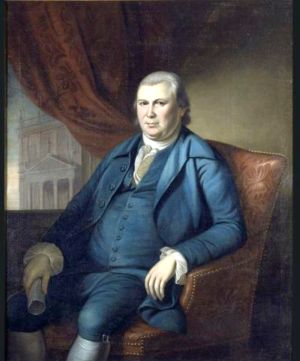
|
| Robert Morris |
UNDER the Articles of Confederation, America had a President who presided, but there was no executive branch for him to do anything administrative. The day to day business of the nation was conducted by committees of Congress, who mainly contracted out the actual work. Evidently, Robert Morris, the businessman had observed this system with displeasure, because it only took him a few days to replace it with departmental employees, reporting to him. The affairs of the nation were evidently in such disarray that there is scarcely any recorded resistance to this astonishing re-arrangement, probably viewed as only one of a series of brisk actions by this foremost businessman of the nation, acting in an emergency and to some extent using his own money. Furthermore, the immediate administrative improvement was apparently so obvious to everyone that the system continued after Morris left office, and was absorbed into the 1787 Constitution without much-recorded debate. Without dissent, as we say, the bureaucracy had been created. As the press of business steadily increased the bureaucracy, from a handful of employees to many millions of them, the fourth branch of government was created without any Constitutional mission statement, not one single word. Following directions set by early America's preeminent no-nonsense businessman, control of the bureaucracy was placed within the Executive branch, in time largely located within the District of Columbia, and governed by rules made by the Civil Service Commission. Sometimes this fourth and largest branch of government skirts dangerously close to encouraging insubordination to their politically appointed superiors.
For some reason, the State Department is particularly suspected of such "Yes, Minister" behavior. Increasingly, government subcontractors are relied upon ("privatization"), as the growth of public sector workforces a return to the subcontractor approach of two centuries earlier; such subcontractors increasingly find the bureaucracy assumes the role of the second Board of Directors. And for the same reason as before: the work of the central government keeps increasing. At a state and local level, an uncomfortable amount of political funding can be traced to utilities and other corporations who have been awarded legal monopolies, uncomfortably like the mercantilism which our colonist ancestors had found so repugnant to deal with. In the 21st Century, we are finally approaching the point where we can foresee the number of people working for some level of government becoming greater than the number of voting citizens, and therefore able to control their income and the nature of their work. When the bureaucracy begins to exert political election power over its elected superiors, elected politicians are almost certain to rebel at what they will surely see as going a step too far. However, on the topic of salary and work environment, they are likely to become allies. Public discontent is already echoed in the growing political movement to limit or shrink the size of government; it would be well to examine and pilot test alternative options before this one gets us into trouble.
In retrospect, this was one of many features of creating the three branches of government where broader implications went unnoticed in 1787. The British government had three branches, King, Parliament, and Judiciary. To create a government consisting of a President, a Congress, and a Judiciary did not then seem like much of a departure. However, the Revolution deposed the King and made the people sovereign. When the real implications of that breezy slogan had to be translated into legislative language serious implications emerged, unexpected then, and now hard to change.
Reconsidering All Our Laws
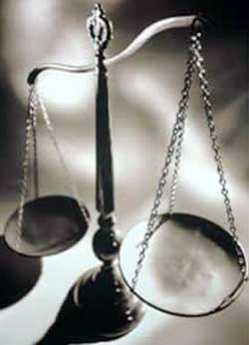
|
| Common Law |
A KING who conquers a new country theoretically gains the chance to revise all its laws. However, thousands of years of experience demonstrate that those who are good at wielding the sword seldom have much interest in, or aptitude for, devising a legal code. Napoleon seems to have been an exception, and Alexander the Great was tutored by Aristotle, but most conquerers have been illiterate in the law. Therefore, earlier conquerors merely extended their native laws into additional territory or else left the whole business to a permanent priesthood of judges. In this way, an independent judiciary could survive unless, like Thomas a Becket or Thomas More, it grew stubborn about thwarting the wishes of the King. The concept of citizen rights more or less defined feasible limits to what the King was allowed to do. British law went still further, distinguishing between rights of the people and rights of the sovereign. It identified those few things even a King was not allowed to do, as well as those many things he alone must be able to do in order to govern. The latter were collectively called the King's Prerogative. Today, we would call it a job description.
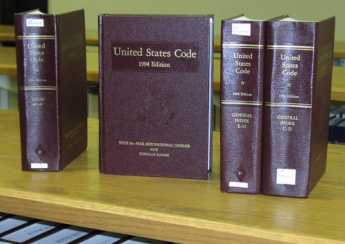
|
| U.S. Codes |
Along those lines, the English Civil War had been fought, briefly transferring the power of Prerogative to Parliament, and incidentally clarifying some disadvantages of doing so. Americans, after fighting an eight-year Revolutionary War to be rid of a particular king, had developed a sentiment for eliminating all kings entirely. However, the memory of the English Civil War and subsequent abuses by the Cromwell Parliament restrained that impulse. The alternative idea grew of transferring sovereignty to the people, to be translated into action by their elected representatives in the Legislative branch. Although such sovereignty would be unlimited, the intermediate steps taken by the Legislature could be deliberately slowed down, and particularly worrisome actions might be tangled up in complicated steps of legal process by a vocal minority. Such a complicated system required an umpire, which Chief Justice John Marshall eventually positioned the Supreme Court to be. Conducting elections every two years was a simple way to allow the people to restrain its agents from the misbehavior of a more general sort. Since George Washington was confidently expected to be the first President, it was left to him to devise protections against presidential abuse, since he had notoriously and repeatedly expressed his intense dislike of kings. In modern times this system of checks and balances has only been severely tested once, in 1937. Immediately after winning a landslide re-election in 1936, Franklin Roosevelt nevertheless was slapped down hard by public outcry forcing Congress to thwart his Supreme Court-packing scheme.
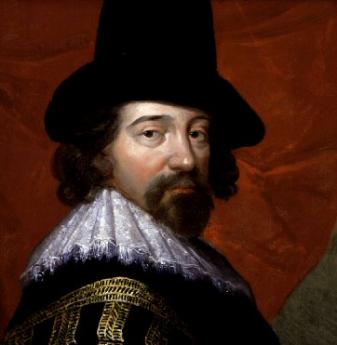
|
| Sir Francis Bacon |
Such subtle, complicated ideas cannot be implemented by writing 6000 words on a piece of paper, and they certainly cannot withstand two hundred fifty years of subsequent nit-picking by dissenters, no matter how carefully crafted the 6000 words may have been. The complexity of the political system it describes would long ago have fallen apart without a million little accommodations and revisions, just as every other nation's constitution has done during that same period of time. And that fine-tuning process was made possible by starting with a more or less blank slate, with thousands of lawyers and legislators debating every particle of common law for more than a century. In 1787 it was decided to adopt English common law as a default position, and to invite a host of legislative bodies to debate and replace any part of it with a "statute". It was a laborious process. Measured by pages of law books, the volume of statutes only grew to equal the volume of common law by the time of the Civil War. The English common law was certainly a good place to start, having been created by Sir Francis Bacon two hundred years earlier as the legal equivalent of the Scientific Method; based on real, adversarial contested case decisions, a hypothesis was created, then tested, revised, and tested again. By actual count, one state legislature only enacted three statutes in the year before the Constitution was ratified; all its other activity was concerned with adjudicating disputes within the boundaries of the existing common law. But when the Constitution suddenly rearranged the balances of power in 1787, almost every sentence of common law had to be regarded as potentially requiring modification to reflect the new Constitutional rearrangements. During the first half century there existed great enthusiasm for almost all of the new Constitution except those parts which affected slavery, the fine-tuning was almost universally intended to strengthen it or repair some oversight. If it failed in some way, adversaries were quick to point out the flaws. In short, every lawyer in the nation was involved to some degree for a century in the process of re-writing the English common law for American purposes, in American circumstances, for the grander purpose of strengthening the American commonwealth.
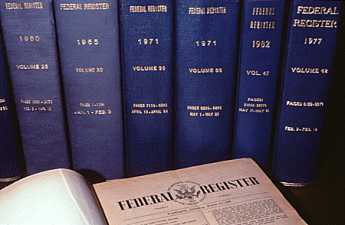
|
| Federal Registry |
And everyone knows what happened next. The state legislatures who considered it normal to pass fewer than a dozen laws in a year started passing fifteen hundred in a year and kept it up for many years. Today, almost every state legislature considers more than a thousand bills and passes two or three hundred. Since the colonial legislatures passed few laws and spent most of its time adjudicating disputes about existing law, the character of the law changed as it gradually gave up adjudicating, stopped being like a court. The tendency of early law was to state principles to guide the judges. In recent times, our over-lawyered system specifies all imaginable conditions and exceptions in excruciating detail, so that our laws tend less and less to speak of "reasonable amounts" and more and more to define drunken driving, for example, in milligrams per deciliter of the defendant's blood. We have better measuring devices, so we measure. But who can deny that a legislature accustomed to making judgments itself, will more confidently rely upon the good judgment of courts, than a legislature which spends its time going to committee meetings to consider the testimony of experts, often never visiting a courtroom?
Our lawyers, who once enlisted the efforts of the entire profession for a century into refining the English common law into the American statutory law, are to be encouraged to extend equal effort into the process of turning off the faucet. Or possibly, having done such a good job at this assignment, seek another line of work?
Corporations: Property, but also Immortal Persons
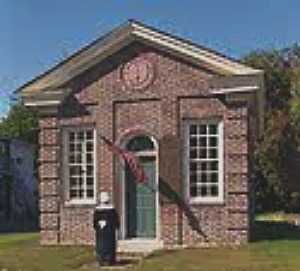
|
| Proprietor House |
The Proprietorship of West Jersey is the oldest stockholder corporation in America. Devised by William Penn it has been doing business in Burlington, New Jersey since 1676. The Proprietorship of East Jersey may possibly have been created slightly earlier by William Penn, but recently dissolved itself, thus leaving a clear path for West Jersey to claim to be the oldest. For a hundred years before 1776, corporations were devised by the King through royal charters, and for a century after 1776, most state legislatures passed individual laws to create each corporation, one by one. Consequently, there were a great many variations in the powers and scope of older corporations, with a heavy emphasis on the purpose to which the business was limited. Eventually, so many corporations were created that a body of law called the Uniform Law of Corporations simplified the task of incorporation for the legislatures. The Proprietorships of East and West Jersey would now probably be described as real estate investment trusts (REIT), but the Uniform laws now tend to diminish the emphasis on corporate purpose. It is now common to have a corporation proclaim the ability "to do whatever it is legal to do."
Many voices have been raised in opposition to corporations, largely claiming unfairness for a large and established corporation to compete with newcomers, especially small newcomers striving for the same line of business. Because of its immortality, a stockholder corporation can achieve dominance no individual could hope for, while because of its multi-stockholder ownership, it can generally raise larger amounts of capital. Moreover, because of its size and durability, a corporation can become more efficient and offer the public lower prices and higher quality. As much as anything else, a corporation can generally hire more employees and pay them higher wages; as even the unions admit, corporations create jobs, jobs, jobs. No doubt, state legislatures are attracted by the tax revenue derived from major corporations, but the quickest way to stimulate the economy has repeatedly been found to grow out of lowering corporate taxes. Since there is scarcely any purpose of creating a for-profit corporation unless it eventually pays its stockholders some kind of dividend, all corporation taxes have the handicap of double-taxation for a fixed amount of business. The Republic of Ireland recently lowered its corporate tax rate severely and triggered so much new corporate activity that it inflated and destabilized its whole economy. The result was a dangerous economic crisis, but politicians privately and world-wide silently derived only one real conclusion: lower your corporate taxes if you are looking to stimulate jobs, jobs, jobs.
The corporate model of business thus looks pretty safe, in spite of envious criticism, and is what most people mean when they speak of capitalism. The Constitution had the intention of extracting Interstate Commerce for the Federal Government and leaving the regulation of every other business to state legislatures. The Roosevelt Supreme Court-Packing dispute of 1936 twisted the meaning of Interstate Commerce to mean almost all commerce, but Congress wasted no time specifically exempting the "Business of Insurance" from federal regulation and returning it to the state legislatures in the 1945 McCarran-Fergusson Act. Although the matter remains one of some dispute, it is roughly correct to say that all commerce is federally regulated, except insurance. The corporation is nevertheless usually a creation of some legislature, and legislators have wide latitude in regulating them. To illustrate, in the early days of a banking corporation, the Bank of Hartford was delayed in receiving incorporation by the strong legislative suggestion that a closed stockholder list would result in refusal to incorporate them, whereas opening up the list to new stockholders might result in rapid approval. The implication was strong: the legislators wanted some cheap or free stock as a condition of incorporation. The following year, 250 banks were incorporated, and the year after that, over 400 more. Making of incorporation applicants by politicians was sharpened to a fine point in Pennsylvania in the late 19th Century, when legislatures accorded monopoly status to public utility corporations, withholding it from competitors. It is now a textbook statement that the funding of substantially all municipal political machines is derived from voluntary contributions by utilities with politically granted monopolies, who are consequently indifferent to the retail prices of their products.
So there is still room for public concern and vigilance, and both the courts and the Constitution protect but restrain corporations. In the early 19th Century when public opinion was becoming firmer about incorporation, it was contended they should be treated as persons, possibly resembling real persons more closely by imposing a finite life span on their charters. Although corporation entities are still to some degree treated like individuals, the legal doctrine prevailed that they are in fact contracts between the state and the stockholders. The paradox is thus defended that although legislatures can create corporations, they cannot dissolve them! After all, a contract is an agreement between two parties, and it requires both parties to agree to dissolve the agreement. And then, the final uncertainty was removed by John Marshall. The U.S. Supreme Court in the Dartmouth College case applied Article I, section 10 of the Constitution. That section provides that state governments may not pass any law impairing the obligation of contracts. The Supreme Court decision written by Marshall made it clear that this provision of Constitution eliminated any distinctiveness between a contract involving a state and a contract involving two citizens. There had been a growing feeling that private property was not to be disturbed by state power, and this linkage to Article 1 affirmed that point and finally settled matters. Shares of company stock were property, protected from state legislatures as belonging to the owner and not to the state in any sense. All the while that this quality of the property was established, certain features of the corporation as a person endured. Most of the attention to this point arose after the Civil War when the mixture of concepts ( a slave was a person who was also private property) more or less applied to the institution of slavery as well. More recently, potential muddles have been created by limiting campaign contributions of corporations, thus impairing their right to free speech in the role of a person. It even appears to be true that some of the 1886 precedents were created by an error of a court reporter. The dominant precedent in operation here would appear to a layman as, "If it ain't broke, don't fix it." Additional centuries including a Civil War thus encrusted conditions and traditions onto the hybrid idea of a corporation which now allows it to stand on its own feet, more or less free at last.
The legal profession can certainly be congratulated for constructing two institutions which include the majority of working Americans -- the corporation and the civil service -- without the slightest mention of either one in the Constitution. Although everything seems to be reasonably comfortable, and no one is actively proposing substitutes, it is uncomfortable to hear so much dissension about the original intent of the Framers, when so much of American Law traces its history to events and institutions which the Framers never imagined. Constitutional Law, both within and without original intent, will soon be dwarfed in effect by non-constitutional accretions to it. Sooner or later, the advocates of some undefined cause could find it in their interest to challenge the Judicial system for what has been allowed to happen. Expediency has triumphed. We started with nothing but the common law (defined as law created by judicial decision), and we are slowly returning to that condition under a different name, misleadingly called statutes.
How Could We Improve State Legislatures?
NEARLY every student of government agrees, the state government is the weakest part of the American system. Almost every academic or federal congressman, at least, seems to hold that belief, while almost any lawyer would prefer to have his case in Federal court rather than before a state judge. Although the followers of Thomas Jefferson kept the nation in an uproar for forty years pursuing his notion of government identical with the will of the people, the public opinion he prized nevertheless remains scornful of state government. Such scorn by itself can undermine legislative quality, creating a destructive cycle.

|
| Small Town |
Students of government point to instability and unpredictability as main features of concern about state government. The legal profession values a central principle, called stare decisis: Leave the Law Alone. Stability, or order is desired so highly that dictatorship, corruption, and poverty may be tolerated in order to achieve it. Conversely, an inability to predict what is coming next is highly destabilizing, a sign of amateurism at the controls. Any decision is better than no decision, even a bad decision is better than no decision. The public hesitates to act in the face of indecisive governance, and dynamism drains from the environment. Most of the time it doesn't make much difference what a rule says as long as it is emphatic and prompt. And it's usually the case that bad decisions are quickly reversed. Test it yourself: how much difference does it make whether a one-way street runs East or West? But it would make a considerable difference if almost any street changed Eastward to Westward to Eastward again, several times capriciously. Suppose someone did make a bad mistake: Eastward to Westward and back to Eastward again. Everyone can now see that Westward was a dumb idea, you bonehead. It will be a very long time before anyone tries that, again.
A second general characteristic of state government is the location in a small remote town. The capital of Michigan is in Lansing, not Detroit. In New York, it is in Albany, not New York City, and in Pennsylvania, it moved from Philadelphia to Harrisburg. Even in little Delaware, it is in Dover, in Maryland, it is in Annapolis rather than Baltimore. And so through most of the fifty states, we see the same pattern. No doubt it could be argued: getting away from big-city bosses and political machines is positive, and stretching a network of highways through the open countryside to the new capital is a source of real estate development for the state. But it definitely creates weakness of the governing system to locate it in towns that have little newspaper coverage, no think tanks, few universities, and even poor airports, school systems, museums, and civil society. These are generally one-industry towns, where the children of the bureaucracy all go to school with each other, along with the offspring of lobbyists. Voices in the past have been raised against the development of a ruling class, as might have been seen in Potsdam outside of Berlin and similar political suburbs. But we have just as surely developed a bureaucratic subclass in Bethesda, Maryland and Alexandria, Virginia. No doubt there are many other similar clusters, in other states. Where the children of bureaucrats are clustered in the schools near the Washington Post and the National Journal it can be argued they know the inside game of politics, as well as the children of Boston, know the inside baseball of the Red Sox, and there is a certain value to developing such a political artisan class. But in the vast majority of the country, the dominant problem is that the voters of the state have not the faintest idea of how their state government is functioning. The children of bureaucrats may still learn at the dinner table how to adopt "Yes, Minister" behavior or how to find lifetime bureaucratic jobs with accidentally high fringe benefits. The big flaw is the rest of the state does not realize the smallest part of how prevalent such behavior is in the capital. If the politician who is caught in a scandal is largely unknown to the general public, it is an advantage to the political class. With less notoriety, there is less scandal, possibly even lighter punishment from judges he has been involved in appointing. Rising above this sort of sorry behavior, the quality of legislation is surely diminished when there is diminished fame for doing a good job, diminished scorn for incompetence.
To a certain extent, this pressure for mediocrity is augmented by the reduced importance of the subject material. The federal government is involved in foreign policy and monetary issues Constitutionally forbidden to the state legislature. Even at the bottom of the hierarchy of public notice, the activities of mayors and city councils have a more direct effect of the lives of the local voter than state government does, with importance shaved off at both the top and the bottom. Such activities really can possibly afford to be relegated to some rural small town with nothing to do except play poker and drink in the bar of the local hotel; it's a question which is a cause, which is the effect. The Constitution provides that the Federal government shall be limited to a dozen specified activities, while everything else is governed by the states. Unfortunately, two hundred years of chipping away at the wall separating two governments of limited powers have left the states with little scope to govern anything substantive except the insurance industry. That does not prevent most state governments from considering more than two thousand bills a session, but these are matters of little import, boring, boring.

|
| Big City |
The Progressive Movement of the early Twentieth century saw much the same problems, being handled by much the same sort of people; but they over-reacted to it. Like most reform movements, the Progressives wanted to make a big splash and then go home. A century later, it is difficult to assess how outrageously corrupt the Senatorial process may or may not have been at that time in the past. Somehow, the public became convinced the U.S. Senate was a terribly rotten organization because of the terribly rotten selection system for U.S. Senators. Consequently, the Seventeenth Amendment passed with little fanfare, taking the selection process away from "the states" and giving it to a statewide popular election. In states with large urban political machines, this change meant giving the nominating process to big-city bosses, taking it away from the legislatures. That is definitely a distinction without much difference. Most big-city political bosses are content to select obedient hacks for nomination to the legislature, but this is the source of most rotten boroughs, gerrymandering, corruption, and mediocrity. In the areas of rural machine politics, the boss himself is more commonly attracted to the appointive legislative jobs. In New Jersey, the election law prohibits more than small campaign contributions to legislators but permits unlimited contributions to the county boss. Either way, the progressive reform of 1913 has not had much progressive effect. One thing is very certain. When the method of selection of the state's U.S. Senator is left to the legislature, the resulting Senator is pretty certain to be a current member of the Legislature. And in the instant you aspire to be U.S. Senator, it becomes very clear you will greatly enhance your chances if you first run for the legislature. There were once likely to be half a dozen senatorial aspirants within the Legislature at any one time, so there was an appreciable improvement in the quality of the Legislatures. True, there was probably more grand-standing and maybe even vote-swapping in return for assistance on the Senatorial seat selection. But there was also much more attention paid in return to the state's interests, by the U.S. Senate. The state's voice on the national scene was considerably louder. The value of a legislative seat and the later experience it provided were much enhanced by possessing the power of selecting a U.S. Senator.
A measured assessment of the effects of the Seventeenth Amendment is long overdue. My own view is that ripping the selection process away from the state legislatures and substituting a second popularly elected national legislative house, was both an over-reaction and a careless gesture without much improvement. Because vested interests have been created, it is now nearly useless to ask the present Congress to study the matter. We have to hope that some rich private citizen will see the need for a serious study of these issues, and both fund the effort as well as leave it alone. If it gets captured by ideologues, it will require a second study, or maybe even a third.
And finally, we get to Earl Warren. former governor of California, and President Eisenhower's choice for Chief Justice of the Supreme Court of the United States. Eisenhower later once referred to the appointment as the worst decision he ever made. Two decisions are said to have been his pets: Baker v. Carr and Reynolds v. Sims. Prior to these two decisions, it was really only possible to gerrymander Congress and the fifty state Legislatures. The U.S. Senate and the various state Senates were elected by geographic boundaries, and couldn't be gerrymandered. Tracing back to a corridor conversation between John Dickinson and James Madison, Dickinson had caucused with the other small states and was in a position to block almost any Constitutional Provision at the Convention. He used words to the effect of, "Do you want a Constitution, or don't you?" and went on to describe his total unwillingness to allow big states to dominate small ones. Out of this, Ben Franklin cobbled a compromise of a two-house Legislative Branch. To pass, any legislation would require the approval of both houses. The House of Representatives would have proportional representation, while in the Senate each state would have two senators, regardless of its population. Eventually, almost every state Legislative branch followed this pattern, although it was not a provision of the Constitution.
The hidden dissention in 1789 was over slavery, but Dickinson was a shrewd and experienced lawyer. He knew human nature, and the best example of the power of his insight has later emerged as California has become the largest state. Every new insurance design first seeks to conform to California laws, because it's expensive to launch a new project, and you might as well assure yourself of conforming to the rules of the largest market, first. The smallest state, Delaware, was not about to be pushed around like that, even on many unrelated issues. But centuries later, Earl Warren had learned the same lesson in reverse and lunged for it when he became Chief Justice. Using the argument of "equal justice", he forced 49 state Senates to adopt proportional representation, just like the other house in their branch. New Jersey, which I know best, is typical in being forced by this decision to change its Senate from one vote per county to voting by population. The subtlety was that both houses of state legislatures became dominated by big-city machines and hence were capable of being gerrymandered. They thus gained control of the nomination process, and gerrymandering nation-wide has assumed the posture of machine politics dominating the selection of candidates. It's certainly true that in the Pennsylvania legislative process, you can regularly observe party hacks drive up, and vote on the floor in accordance with a little card which the "leadership" hands them as they step on the floor. The beauty part of this is that decades later, most citizens haven't a clue what had happened.
Void for Vagueness

|
| Question Mark |
BECAUSE otherwise, everyone would plead ignorance, ignorance of the law has been dismissed as a defense for thousands of years. What, then, is the situation when the statute itself is accused? Here, a group of citizens accuses the government of enacting vague laws, conceivably with the malicious intent to give government officers a free hand. Only the U.S. Supreme Court may decide Constitutional issues, and nine Justices are certainly inadequate to cope with a huge vagueness project. The Court must at least define a method for coping with imprecision. What is to be done with this?
 Is it really any longer true that ignorance of the law is no excuse? 
|
This novel proposition is a recent one, mostly because the volume of laws has steadily grown since 1787, when we began the Republic without any statutes at all, to the present gargantuan size of the Federal, State and Local Codes requiring hundreds of feet of shelf space in a library. No human brain can contain all that information at once, not even to mention the interpretive Regulations which grow by hundreds of thousands of pages each year. The limits of practical governance by traditional methods have passed the point where ignorance of the law is a theory, it is an absolute certainty for every citizen in most situations. Is it thus really any longer true that ignorance of the law is no excuse? Perhaps modern computer search capability has advanced to the point where it can conquer this problem for judges in an appellate situation, but woe unto the financier or automobile driver who professes ignorance of the state of judicial dispute resting in the system. Sometime relatively soon, some legal genius must figure out a sensible, workable, way to reconsider the rule that ignorance is no excuse when plainly anything other than ignorance is a laughable pretense.
But this muddle is only a background for a new twist to the same issue. The synthetic process has now created a growing apprehension that duly elected officials have passed laws which are deliberately vague, forcing the country to surrender decisions to a tyrannical process. Leave motive and intent out of the discussion; a tyrant is being created whether a tyrant seeks the crown or not. Just review recent history.

|
| Lame Duck |
We now grow accustomed to seeing proposed legislation thousands of pages long, appearing on the desks of elected congressmen who have been given a day or two, or sometimes less than a day, to approve them. The authors of this proposed legislation are often quite unidentifiable, and might sometimes not even be officials of the government. For a while, there was some talk of appointing "Czars" for certain areas of activity, but this has apparently provoked too much Congressional resistance. These multi-thousand page bills appear out of nowhere in particular, nominally authorized by the Speaker, the Committee Chairman, or some other official of Congress whose freedom of action is actually tightly controlled by arcane but irresistible partisan politics. A legislative body pretending that every member is the equal of every other, is in fact ruled with an iron hand.
Elected representatives of the people, charged with writing our laws, who even happen to belong to the majority political party, are powerless to refuse to adopt the legislation they have not read, and the minority is even more dismissively ignored. Confounding even careful reading of small sections of these bills, they are vague, potentially intentionally so. There is scant opportunity afforded legislators to question the authors of these legislative piles, not even the opportunity to have them reveal their names. Subscribe to this mystery package, or suffer unspoken political punishments. We are told assurances are privately given there will be an opportunity to correct errors when regulations are written by the Executive branch. The Legislative branch effectively removed itself from the expenditure of a trillion dollars for a medical reform that no one could lucidly explain, affecting a sixth of the gross domestic product. Within a month, this "reform" was followed by a highly similar process directed at the financial system of the nation, which likewise bears almost no resemblance to the problems it claims prompted the action. Small wonder the countryside is dotted with Tea Parties, and small wonder they are confused by what they want. Chief among their objectives is a demand to return to an understandable system, controlled by the legislative branch, not the executive one.
Whether the applicable term is "vagueness" or whether an underlying motive is to be alleged by calling it "deliberate ambiguity", a former Justice of the U.S. Supreme Court once supplied an adequate slogan for these legal barricades. Justice George Sutherland, who sat on the court from 1922 to 1938, constructed the legal standard for the unconstitutionality of criminal cases called Void for Vagueness . It seems a sufficiently evocative slogan for fall election campaigns, and it might even serve as a legal claim in a Supreme Court test of the matter.
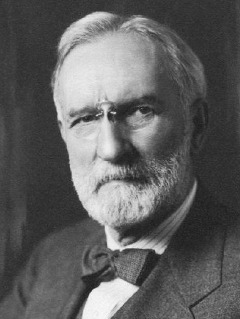
|
Meanwhile, we have wars to fight, and the deepest recession in eighty years, plus whatever events national or international news may force us to contend with. A monumental Supreme Court test seems an almost welcome alternative. To make it possible, the Court will have to resolve the difficulty that this issue is neither criminal nor civil in the usual sense, and there is no third alternative. Furthermore, there is the picky-picky quibble that the doctrine of "void for vagueness" has only previously been used in criminal cases. We will have to endure the Republican resurrection of George Sutherland as a former American Bar President, whose elevation to the Supreme Court was so anticipated by everyone that he was unanimously confirmed, without hearings, the day he was nominated.
The fact is, popping the bubble of "void for vagueness" in this particular political tap dance is only an early warning that the nation is already inundated in a sea of bewildering rules. To the point where ignorance of the law must be acknowledged to be the common fate of all citizens. The law must soon address the matter, uncharacteristically remembering that the first step in resolving any true crisis is to decide which rule must be broken.
Obamacare's Constitutionality
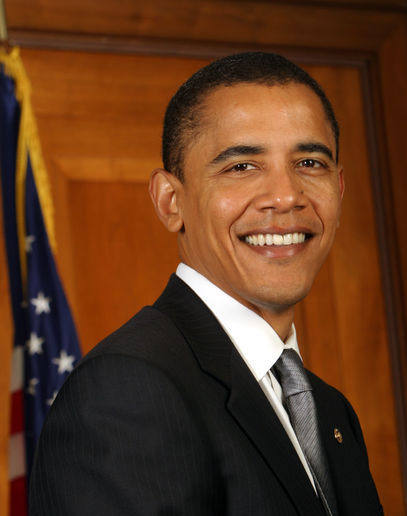
|
| President Barack Obama |
Any idea of a smoothly orchestrated introduction of the new law was jarringly interrupted by the U. S. Supreme Court, which granted a hearing to a complaint by 26 State Attorney Generals, that the ACA Act was unconstitutional. It was big news that the whole Affordable Care Act might be set aside without selling a single policy of insurance. The timing (before the Act had actually been implemented) served to guarantee that the constitutional issue, and only that issue, would be discussed at this Supreme Court hearing. By implication, there might be more than one episode to these hearings.
While many could have declaimed for an hour without notes, about difficult issues perceived in the Obama health plan, questioning its constitutionality had scarcely entered most minds. Then of a sudden, near the end of March 2012, a case testing the constitutionality of mandatory health insurance was granted certiorari and very promptly argued for three full days before the U.S. Supreme Court. Twenty-six state attorneys general brought that case, so it was not trivial. In jest, one Justice quipped he would rather throw out the whole case than being forced to spend a year just reading 2500 pages of it. But Justices are practiced in the art of quickly getting to the heart of a matter; it soon boiled down to one issue: was it constitutional for Congress to force the whole nation to purchase health insurance? Is there no limit in the Constitution about what the federal government can force all citizens to do, even though the federal government itself is severely limited in scope? Even though the Tenth Amendment states that anything not specifically granted to the federal becomes the province of the states? Would a people who fought an armed revolution for eight years over a 2-cent tax on tea, now consent to a much larger requirement which it was not constitutionally authorized to impose? Most people finally wrapped their heads around some formulation of this non-medical concept to a point where they vaguely understood what the Judges were arguing about. This was beginning to look like a topic where We The People made a covenant with our elected leaders, and reserve the sole right to change it.
 The powers not delegated to the United States by the Constitution, nor prohibited by it to the States, are reserved to the States respectively, or to the people. 
|
| Tenth Amendment |
The Constitution describes a Federal system in which, a few enumerated powers are granted to the national government but every other power is reserved to the state legislatures. The Constitution had to be ratified by the states to go into effect, and the states had such strong reservations about the surrender of more than a handful of powers that they would not ratify the document unless the concept of enumeration was restated by the Tenth Amendment. If states could not be persuaded of the need for a particular power to be national, they might refuse to ratify a document which enabled permanent quarrels about the issue. That wariness explains why The Bill of Rights goes to the extra trouble of declaring certain powers are forbidden to any level of government.
Separation of powers further explains why Mr. Romney's mandatory health insurance plan might be legal for the Massachusetts legislature but prohibited to Congress. After Chief Justice Roberts got through with it, whether that truly remains the case will now depend on whether it is described as a tax, a penalty, a cost, or whatever, and only if the U.S. Supreme Court later agrees that was a proper definition. Because -- to be considered a tax it must be too small to be considered coercion. The law itself apparently does not underline this distinction in a way the Justices felt they could approve. Indeed, while Mr. Obama in his speeches firmly declared it was not a tax, later White House "officials" declared it might be. There was agreement the Federal government could tax, but no acknowledgment that taxes might have any purpose other than revenue.
Under circumstances widely visible on television, however, it was clear that the House of Representatives had been offered no opportunity to comment on this and many other points in this legislation. To a layman, that fact itself seems as clear a violation of constitutional intent as almost any other issue, since the Constitution indicates no idea was ever contemplated that any President might construct laws, nor like the courts, interpret their meaning. The first three Presidents repeatedly raised the question of whether they had the authority to do certain things we now take for granted. And Thomas Jefferson was similarly boxed in by a clever Chief Justice, who said, in effect, Agree to This Decision, or be Prepared to Get a Worse One. The Constitution says it is the function of the Executive branch to enforce the law, "faithfully". Presumably, all of the thousands of regulations issued by the Executive Branch under this law must meet the same test.
Given that the Justices now hold it constitutional for the federal Congress to mandate universal health insurance, based on some authority within taxation, the immediate next issue is paying for it. Millions of citizens, usually young and healthy but sometimes for religious reasons, do not want to buy health insurance and would be forced to do so by this law because the only available alternative is to pay a revenue tax. The purpose of including them is to overcharge people who will predictably under-use community-rated insurance, and thus enable the surplus to reduce costs for those who do want to buy health insurance. (Here, the Court had the pleasure of reducing an unusually opaque law to an unusually succinct summary.) To avoid the charge of a "taking", the Administration must either surrender on the universal mandatory point or else surrender the level premiums of community rating. The lawyers for the complaining attorneys general laid great stress on this particular issue in their arguments, and it occasioned much of the discussion from the bench. However, until the law is in action there is as yet no cause for damages.
Here it will depend on whether you call it a permissible activity for Massachusetts or for the Federal government. The Constitutional point seems to be that it is a legitimate Federal power to tax for the "general welfare", so it now becomes essential to know if the taxes for noncompliance in Obamacare are really a penalty. The Justices seemed to be questioning whether the whole scheme would collapse with the forced subsidy eliminated, and because of that be deemed to have been a "general welfare purpose" adequate to meet the constitutional requirement of a permissible enumerated purpose. Lawyers can generally find such a defined purpose in the words of the Constitution, even if they have to dip into the penumbras and emanations of the words. So the question might just devolve into whether a majority of the Justices wish to declare the penumbra to be within the enumerated powers of Congress. To all of this, the lawyers for the attorneys' general reply that such an enumerated power is impossible because there is no limit to what could be done by this method. Congress would then be allowed to mandate that everyone eat broccoli for dinner, or buy a General Motors car in order to pay for the deficits of rescuing that company from bankruptcy. Almost anything could be mandated by establishing a penalty called a tax; including a mandate that everyone buys a product in order to pay for the deficits of mandating it, illustrates there exists at least one circularity of enumerating something like a power of Congress. According to this reasoning, mandated health insurance cannot, therefore, be an enumerated power of Congress, either now or at any time in the future. The sort of speculative law outlined in this paragraph is exactly the sort of thing the Supreme Court dislikes and shows the utility of denying access to the courts to anyone who cannot claim "standing", defined as a claim of actual injury from a law.
The Justices undoubtedly had to weigh the fact that the American public has a strong distaste for this sort of convoluted reasoning, which sounds like a convention of Jesuit priests having fun. On many other occasions, however, the public has accepted the judgment of people it hired to understand this sort of thing; that's called respect for the law. Eighty years ago in the Roosevelt court-packing case, there was the same sort of collision between the Court and the President, and the Court knuckled under even though the public supported the Court. In both cases, the Court seemed to be yielding to the President, with the unspoken compromise that the President would not pursue his earlier course with quite so much vigor. Since the really central 1937 question of overturning the Interstate Commerce clause ("Commerce among the several states") was left unaddressed, the velvet glove might yet contain an iron fist.
Sanctity of Contracts
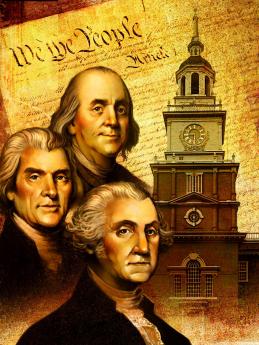
|
| Constitution |
THERE is little doubt many state legislatures behaved in a capricious and high-handed way in the twenty years prior to the 1787 Constitution. Outrage at this behavior was one of the important stimulants to writing the Constitution, as well as putting public pressure on state legislatures to ratify it in 1788. Section 10 of Article 1 is devoted to limitations on state behavior deemed to be generally offensive or otherwise contrary to the national interest. Among the comparatively short list of absolute prohibitions is found "No state shall......, pass any law.....impairing the obligation of contracts, or grant any title of nobility." This section condemns certain behavior as indefensible but does not specify the Federal government to be similarly limited, along with the states. However, the government which was established as one of the limited federal powers. Unless a power was specifically granted to the Federal government, the Tenth Amendment announces it belongs to the states, or, as the Ninth Amendment would have it, to the people. There seemed no need to limit the scope of a power which could not exist. The Tenth and final Amendment in the Bill of Rights ended the 1791 Constitution with the words:
X. The powers not delegated to the United States by the Constitution, nor prohibited by it to the states, are reserved to the States respectively, or to the people.
A modern capsulation might be: the Federal Government is no more empowered to impair the sanctity of contracts than it is to grant titles of nobility.
The Framers of the Constitution were inexperienced in the habits of a republic, or they might have anticipated the general tendency of those who are empowered to enforce the law, to flout it in their own behavior. Around the smallest courthouse in the nation, one need not be surprised to find the Sheriff or other local worthies, parking their cars in illegal spots without fear of punishment. It is not just state legislatures who are tempted to disobey the laws they pass, but a general tendency of all authority to do so. It requires a local citizenry with a very short fuse, displaying instant hostility to the first sign of this sort of swaggering, to keep their local newspapers from filling up with scandal stories in the weeks before an election. Many of these stories are politically motivated, of course, but it must be admitted that in a naughty world, they are necessary.
 No State shall enter into any Treaty, Alliance, or Confederation; grant Letters of Marque and Reprisal; coin Money; emit Bills of Credit; make any Thing but gold and silver Coin a Tender in Payment of Debts; pass any Bill of Attainder, ex post facto Law, or Law impairing the Obligation of Contracts, or grant any Title of Nobility. No State shall, without the Consent of the Congress, lay any Imposts or Duties on Imports or Exports, except what may be absolutely necessary for executing it's inspection Laws: and the net Produce of all Duties and Imposts, laid by any State on Imports or Exports, shall be for the Use of the Treasury of the United States; and all such Laws shall be subject to the Revision and Control of the Congress. No State shall, without the Consent of Congress, lay any duty of Tonnage, keep Troops, or Ships of War in time of Peace, enter into any Agreement or Compact with another State, or with a foreign Power, or engage in War, unless actually invaded, or in such imminent Danger as will not admit of delay. 
|
| Article One, Section 10 |
A 21st Century illustration is found in a letter sent to current beneficiaries of Social Security, reducing their monthly check by twenty or more percent in some cases, and in other cases just a few dollars. The notice says that this deduction is based on IRS reports of the individual's income, using material supplied by the Internal Revenue Service, thereby triggering an additional side question about the right of the government to use supposedly private information to impair the obligation of the Social Security contract. Setting the privacy issue aside, what is illustrated is an even more discouraging violation of the expectations for fair dealing. This is a privacy right which might have been enforced by an excruciating repetition of the time-consuming requirement of manual specification. Now that computers are more common, what formerly needed no specification, now perhaps begins to need it, since endless repetition is now so tediously conventional.
Governments casually violate the sanctity of contracts when it is self-serving to do so, and presumably, it can be shown that they neglect to violate, or even punish those who violate, whenever such violations are to the advantage of anyone else. It has been said that this matter has been adjudicated in favor of the government in the past, thus creating a precedent, stare decisis, so to speak. Whatever the logic of such precedents, growing Constitutional literacy among the public is going to demand that the matter be re-argued. That is to say, it is comparatively easy to imagine growing knowledge about the Constitution among the citizens, while it will never be easy to expect the public to puzzle through the steps in a judicial chain which explicates how the reverse is now a superior view. Therefore, the demand for re-argument should be a growing one.
John Marshall Decides Three Cases
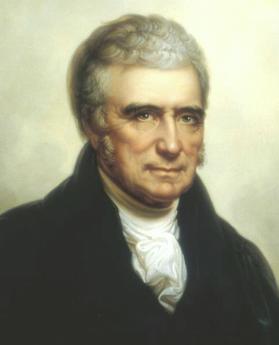
|
| Chief Justice John Marshall |
John Marshall, taking sixteen years to do it, transformed the Constitution internally into the cornerstone of the Rule of Law, making the legal profession its guardian. Nine respected justices now essentially hold lifetime appointments as bodyguards of the structure Marshall designed, with all lawyers acting as lesser officers. Nevertheless, four personal things are important to remember. Marshall had been a Revolutionary soldier, he wrote a five-volume biography of George Washington, he positively hated his first cousin Thomas Jefferson. And his thirty-five-year tenure as the third Chief Justice of the U.S. Supreme Court coincided with some of the dirtiest national politics the nation has ever seen. Marshall's enthronement of Chief Justice control of the federal courts was tolerated because it promoted them both to national power. And when this tough politician had earned the loyalty of both the court system and the legal profession to himself, he transformed the image of the Constitution from a contract between the states into an American Bible for the Rule of Law. Incidentally, he could beat anyone at horseshoes, a game requiring a winner to be both strong and precise. Much of his achievement grows out of three pivotal Supreme Court cases, which today might just as well be regarded as amendments to the Constitution.
 In all Cases affecting Ambassadors, other public Ministers and Consuls, and those in which a State shall be Party, the Supreme Court shall have original Jurisdiction. In all the other Cases before mentioned, the Supreme Court shall have appellate Jurisdiction 
|
| Article 3, Section 2.3 |
Marbury v Madison (1803). The first of Marshall's three cornerstone cases involved the Chief Justice himself. After being defeated for reelection to the Presidency in 1800 by Thomas Jefferson, President John Adams hastened to fill up remaining judicial vacancies before Jefferson his successor could be inaugurated, in a maneuver described as "appointing midnight judges". In a sense, Marshall's appointment as Chief Justice had also been in anticipation of the coming eviction of Federalist office holders, so he was himself more or less a midnight judge, destined to become by many years the last Federalist to survive in office. In any event, he was Adams' Secretary of State, soon to be replaced by James Madison, who would then assume the duty to deliver judicial appointment papers to new judges. Marshall was an impassioned Federalist, bitter about the defeat of his party, nursing personal hatred for Jefferson after years of family differences. To say he had a conflict of interest is not only to brush hurriedly by the issue but also to dramatize what loose judicial standards prevailed at the beginning of his three-decade tenure as Chief Justice.
Appointment papers for the midnight judges were completed and lying on the desk of the Secretary of State when the Presidency changed hands from Adams to Jefferson. Had he known what was coming, Secretary of State Marshall would surely have hastened to deliver the papers, but he had not done so. His successor as Secretary of State, James Madison, on the orders from Jefferson, refused to do it, so Marbury sued for a writ of mandamus, or order from a court to deliver the documents. By this time, Marshall was in a new role of presiding over the Supreme Court, fearful to attack Jefferson head on, but nevertheless eager to command the most humiliating obedience from him. Using the technicality (actually, the plain language of the Constitution) that the request was made to the wrong court, mandamus was rejected by Marshall. However, he went on to say in a judicial aside (obiter dictum) that if the right request had come to the U.S. Supreme Court properly , the Court would have approved it. Thus, in one dazzling maneuver at the beginning of his term, Marshall simultaneously asserted the Court's right to review Presidential and Legislative actions, reproved Jefferson for his ignorant conduct, and boxed him into submission by seemingly letting him win a minor case, but one he could be sure would soon have been followed by major ones if the President somehow evaded this decision. Furthermore, he dazzled the legal profession with this tap-dance, guaranteeing their applause by greatly enhancing the status of judges within the Republic, especially compared with the President. And, it should be mentioned, he suppressed public outcry by performing this set of actions in full public view, cloaked within incomprehensible legal garments. The public could see he had done something important, which only lawyers would completely understand. Marshall plainly began his term by demonstrating the full meaning of the rule of law, and his own position astride that law. The main point was that when ordinary judges include offhand commentary in a decision, it might be ignored. But when the Chief Justice of the United States speaking for the majority of his court, makes a legal observation, it would be a brave lawyer indeed who would bring an action in conflict with it. And as for the President and Legislature, Marbury v Madison had also just brushed them aside. It was all done properly, using civil language but deadly logic.
Martin v Hunter's Lessee (1816). This case might be a little more understandable if retitled as "The Heirs of Lord Fairfax v Fairfax County, Virginia". A Virginia law permitting the seizure of Tory property, written decades before the Constitution, asserted its precedence to Federal Law, and therefore its precedence over Federal Law. (To this day, Virginia never quite forgets it was once the largest, richest state, founded nearly two centuries before the Constitution.) Like Marbury v Madison, the case is clouded by Marshall's personal involvement since the Chief Justice had signed a contract with Martin to buy the land himself. This impairment to the case's claim to legal cornerstone status is not entirely annulled by Marshall recusing himself, turning authorship of the opinion over to his faithful disciple Justice Story. Furthermore, the judicial establishment of the principle that an international Treaty (in this case, the Jay Treaty) takes precedence over an Act of Congress is one the nation may still someday come to regret, if movements for "International human rights" and "universal international law" continue to gain popular traction. Such movements are numerous, including international law for the conduct of wars, and the universal Law of the Sea.
The United Nations might now be more of a force if they had not stumbled over the franchise of hundreds of nations, each given an equal vote. To expect the major nations of the Security Council to obey the single-vote mandates of dozens of small African nations is to agree in advance that the UN must be disregarded. Nevertheless, Martin v Hunter's Lessee did eliminate an escape route from Supreme Court domestic domination which might have proved troublesome in Civil War nullification disputes, or in legal cases for which national uniformity is important. On appeal, the Supreme Court finally declared its absolute supremacy over State courts as a general matter, clarifying a number of legal loose threads which had been keeping the precedence issue alive.
McCullough v Maryland 1819) The facts of this case seem considerably simpler than Marshall's long and thundering opinion of them. Indeed, the opinion sounds more like an oration on the meaning of the Constitution, or an enraged obiter dictum , than a terse opinion that the State of Maryland's legislature had passed an unconstitutional law. His remarks are indeed an exposition on the general thrust of the Constitution, foreshadowing many disputes leading up to the Civil War. In effect, it began to make it clear to the slave states that their states-rights viewpoints might conceivably be upheld on a battlefield, but never in a Courtroom. It is thus an opinion which every law student should read several times, and every citizen would profit from reading at least once. At Gettysburg Abraham Lincoln was to restate the principles in concise, even poetic, language. But long before that, Marshall had stood upon a legal mountain, declaiming them in thundering detail.
 The Congress shall have power---To make all Laws which shall be necessary and proper for carrying into Execution the foregoing Powers, and all other Powers vested by this Constitution in the Government of the United States, or in any Department or Officer thereof. 
|
| Article 1, Section 8, clause 18 |
The United States Congress had chartered the Second Bank of the United States in 1816, which then established a Baltimore branch in 1818. There was a national financial panic in 1818, which probably hastened local bank lobbyists to the Maryland Legislature, looking for relief from the unwanted federal competition. Maryland passed a law imposing a fairly high state tax on the operations of the new federal bank. McCullough, the cashier of the federal branch bank, refused to pay the tax. On appeal, McCullough maintained the tax was unconstitutional, and the U.S. Supreme Court upheld him, ordering the opinions of the Maryland courts to be reversed. John Marshall wrote the opinion and took the occasion to set forth his views on constitutionality. Point by point, my point.
What it meant, the old Federalist in a sense intoned, was the states had lost power at the Constitutional Convention and were not going to get it back. The founding fathers and George Washington, in particular, had been uneasy about accusations they had gone beyond their mandate in even calling the Philadelphia Convention. The Articles of Confederation had declared its own provisions to be "perpetual", and the states had previously bound themselves to that. True, the Confederation Congress had authorized a study of how to improve the Articles, but it had never gone so far as to suggest the Philadelphia Convention toss them out.
When the Philadelphia Convention was finishing up its work, Gouverneur Morris had written a preamble beginning with "We the People" in order to assert that its authorization came from the people and not from the governments directly confederated under the Articles, which was true. The ratification process was carefully steered into the language which asked for ratification by the people, acting by states, and from which elected state officers were excluded. The state ratification conventions heard considerable concern about legitimacy voiced by those who probably really disapproved of one feature or another. But overall it was more importantly true that the people at the ratification conventions gradually grew intrigued by the mechanics of self-rule and appreciative of the depth of thought they could see the founders had displayed. By the time the necessary number of states had ratified, public enthusiasm was genuine, while the opposition was squelched into silence or else indirection of speech. Legitimate opposition was acknowledged by specifying that ratification was conditional upon the adoption of a Bill of Rights. Finally, after the new government was subsequently tested by wars and near-wars, pratfalls and triumphs interspersed, the opposition was not only widely judged to have had its say, but its own chance to stumble. After nearly three decades of this, Marshall seems to have decided it was time to lay down the law. All of that is behind us, he said in effect state governments have knuckled under, and the Constitution is indeed triumphant. It was time to snuff out the grumbling and the scheming, and to declare invalid any future attempts at evasion.
The constitutional compromise had confined federal power to a few defined activities and whatever else was proper and necessary within those powers. It did not limit Congress to "absolutely" necessary and "absolutely" proper actions which might heedlessly confine such limited powers to awkward and inefficient behavior. Rather, the Constitution identified areas of power where the two types of government were best suited, expecting them to do their best without hampering each other with turf battles. If Congress decided that banks, or chartered corporations, were desirable means of promoting commerce which had been left unspecified in the Constitution, states could not for that reason alone interfere with federal use of them. States could charter any corporations and banks they pleased, and the federal government could do the same, but only if necessary and proper. There were many other features left unspecified, proper enough for the states to do, but which the federal government might also do -- when necessary and proper to implement its enumerated powers. It was, in short, improper for states to interfere with what was desirable for the national government to do unless the Constitution prohibited it. And the U.S. Supreme Court would be there to decide close cases.
In particular, the states were not to undermine the federal government in the legitimate pursuit of its enumerated powers. Of the strategies available, taxation was particularly vexing, since the difference between a fair tax and a burdensome one can be a matter of opinion. Ultimately, the power to tax is the power to destroy, and it would be better not to have the states taxing the national government in its operations, like issuing currency. The exception might be made for traditional state activities like taxing the bank's real estate. But if the states can tax currency operations, they can set any price, taxing anything if they set about to undermine legitimate Federal activities; such hampering was not contemplated at the Philadelphia Convention, and it will not be tolerated by the courts. Legislatures whose sovereignty ends at their state borders have no right to tax the entire nation which extends beyond those borders. And since state courts must follow state interests and state constitutions, their rulings are subordinate to those of the federal courts, as well.
With the one possible exception of international treaties, all government entities which might challenge the Supreme Court had by now had their noses rubbed in subordination to it. John Marshall went a step further. He even invented a new way to fashion laws which no one at all could challenge: as long as he spoke for the majority, the asides and comments of the Chief Justice in his obiter dicta had become a sort of supreme law.
Barnes Foundation -- Drawing a New Moral

|
| Andrew Stewart |
Andrew Stewart, the Public Relations Director of the Barnes Foundation, and for thirteen years a member of its Board of Directors, recently addressed the Right Angle Club. He gave a new slant to the quarrelsome saga of Dr. Barnes' will, offering the point of view in favor of moving the paintings to the Parkway. It's useful to hear the legal and historical background because about all we hear are criticisms, balanced by joy at having the famous paintings where we can see them.
Essentially, the will declared a wish for the School and Museum to follow the original indenture. After the passage of time, the old board members died off, and the new board members found the Indenture to be out of date, like specifying the purchase of railroad bonds. Delivered in a charming Scottish brogue, the argument was fairly convincing. But it stimulated in me an entirely different moral from the eternal dispute between the right of a man to have respect paid to his expressed wishes for his own property, versus the self-defeating quality of the same restrictions with the passage of time.
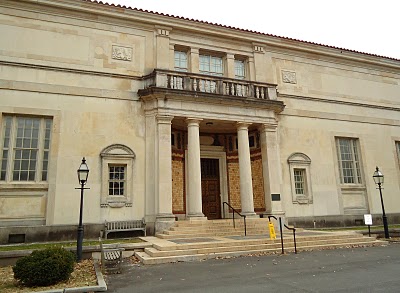
|
| Barnes Foundation |
Barnes was born in Kensington, and had a hard life as the son of a Civil War veteran who lost an arm in the war, and had a dismal time making a living as a butcher. Barnes was his fighting-spirit son, who worked his way through medical school. It was Jefferson Medical College, where I was on the faculty for decades. While it is true his patent medicine gave a permanently sickening color to the children who were treated for sinusitis, it is also true that in the form of eyedrops it prevented the transmission of syphilis to millions of newborn children. In that view, it was a real scientific contribution, although the medical profession continues to take a dim view of doctors advertising their wares. Although he was himself a failed artist, Barnes was a highly successful collector of (then) modern art and started a school with John Dewey to teach art appreciation to poor people. One by one, the local universities snubbed his wishes for an art appreciation school, and the local Philadelphia museums were pretty sniffy about his favorite artists.
In fairness to them, Barnes was probably pretty pushy in his demands. Unfavorable local reception to an exhibition which had received rave applause in Paris, convinced Barnes he was right and they were wrong. After this, Barnes developed a lasting hatred of Philadelphia and all its stuffy ways; he definitely didn't want his own impressionist art to be in Philadelphia, which would never appreciate it. While Philadelphia finally woke up to the value of Impressionist painting, Barnes never relented while he was alive. I hope I give a fair portrayal of the argument except for the politics and the legalities, that I know very little about.
But hearing the arguments, I see an entirely different moral to the saga. Ever since the inflation of the 1930s, fine art has appreciated in value, faster than the endowments to maintain the art. (That's probably a useful tip to investors, too.) It's fairly standard for a wealthy person to donate his art collection, plus a sum of money to endow the maintenance of the art. Most of the time, the size of the endowment is carefully calculated to grow at least as fast as the value of the paintings, because you have to ensure them, and pay for increased security, and increasing attendance. With the new trend toward inflation of at least 2% a year, the old premises don't work anymore, and the endowment eventually runs out. At that point, it runs into restrictions which -- to be perfectly blunt -- were created to prevent the trustees from pilfering the museum. A museum may not sell its art to pay for administrative expenses.
Consequently, The Barnes ran into a situation where it had billions of dollars worth of paintings in the basement, which it could not sell, and could not even hang in the museum because of Barnes' specifications for what went on the walls. This situation isn't going to change, because a dollar in 1913, when the Federal Reserve was created, is now scarcely worth more than a penny. And the present Fed is committed to 2% inflation, forever.
So, how about this: let the lawyers who write wills, and the Orphan's Court which administers them, insist that the art collection be divided into two parts. One would be the permanent collection, just as at present, and the other would be eligible for sale in the judgment of the Orphan's Court.
Arbitration

|
| Arbitration |
The choice of "arbitration" as a term to describe a legal process seems a strange one, since it conflicts with the ordinary use of "arbitrary" as equivalent to a decision made without the use of logic or precedence, and even with "arbitrage" which implies slipping between the cracks. Nevertheless, frequent use of the terms seems to keep their meanings usably separate, at least in a city like Philadelphia which has a lot of lawyers. At any rate, when a lawyer who specializes in arbitration recently agreed to discuss the subject before a recent meeting of the Right Angle Club, the room had very few empty seats.

|
| Arbitrage |
Arbitration settles the same sort of dispute as damage suits, except there is no jury, and the decision of the Arbiter/Judge is final, without appeal. Most of the cases concern disputes between an individual and a corporation, where the two disputants have previously voluntarily decided to do business with each other, but had a falling out because of some misunderstanding. This puts the corporation in a position to insist on using arbitration in the event of a dispute, and the customer has accepted this condition as a requirement of doing business. Although it is true that inclusion of such a requirement in a business contract is often unthinkingly accepted as part of a many-page fine-print boiler-plate provision, the requirement is so common it can often be regarded as well-understood. However, often it is not so well understood by a client, and more serious criticism is that the company writes the detailed language, specifying who the arbitrator is to be.
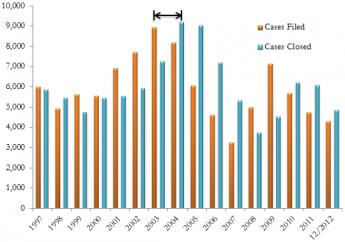
|
| Arbitration Cases |
Nevertheless, arbitration is cheaper and quicker than litigation, so the customer gets some real advantages from it, and the arbitrator generally is more expert in the subject matter than a random jury would be. In the event that a client is offered some choice of litigation in place of arbitration, he is often subjected to rather intense pressure to desist in the effort. Judges often quite openly admit they prefer a more rapid way to clear their calendar, and in the event of some technical complexity are even a little afraid to be drawn in over their heads by it. Right or wrong, when an arbitration decision is rendered, it is final. That is, there is no longer any danger a decision will be reversed on appeal. Most arbitration cases are disputes between investment broker/dealers, or commercial firms, and their clients, where the corporation has some hesitation in harming its commercial reputation by seeming to abuse clients. Therefore the situation tends to encourage a fair amount of brow-beating in order to get the client to sign some agreement that he has been satisfied.
In a sense, arbitration takes on the role of the Courts of Equity of an earlier era. A Court of Equity is designed to cope with a situation in which some obvious wrong exists, but no law exists to address it. As legislatures have had several centuries to pass legislation, Courts of Equity have lacked much use; in fact, the current problem is probably that we have too much legislation. Therefore it is probably true that more important cases end up as litigation, while more routine or commercial cases congregate in arbitration. A random jury serves the purpose of speaking on behalf of Society in an area where the legislature has already had a chance to express the overall attitudes of Society; a jury speaks for fairness, as our civilization views fairness to be. Since an arbitration judge generally concentrates in a certain type of case, he generally is fairly expert in the law of the subject, and it seems likely he renders a better opinion of the law surrounding that particular topic. Whether he renders a better opinion of the merits of the case probably depends on whether his expertise has expanded with experience or merely frozen with the passage of time.
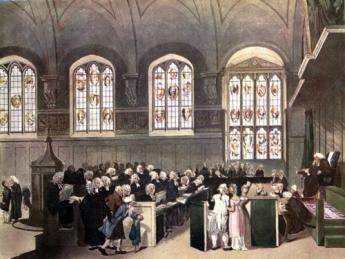
|
| Court of Equity |
When the lecture was over, it was time for questions from the audience. It appears that club members were mainly entranced by the question of whether the choice of arbitration or litigation leads to a better outcome. In one way or another, the same question got the same cluster of answers: arbitration is cheaper, quicker and more final. But the questions kept getting re-phrased in different ways: is the outcome more or less fair than litigation? Finally, one old codger had the floor. "It seems to me, sir, that the plaintiff generally only has one case in a lifetime, whereas the defendant corporation may have thousands of cases. And the defendant gets to pick the arbitrator. Doesn't that seem to create an incentive for the arbitrator to favor the company which can send him more business?"
And the answer came quickly back, "Well, that's how it is. Just suck it up."
As the group filed out of the room, several members told the old codger, "Your question was better than the answer."
27 Blogs
Robert Barclay Justifies Quaker Meetings
 Robert Barclay, one of the handfuls of English philosophers of enduring note, came close to establishing the doctrines of the Quaker Church, a religion with no formal doctrine.
Robert Barclay, one of the handfuls of English philosophers of enduring note, came close to establishing the doctrines of the Quaker Church, a religion with no formal doctrine.
Blood and Honor: The Philadelphia Mafia, Lately
 From 1980 to 2000, mob rub-outs and long prison terms for mobsters seemed a constant occurrence in Philadelphia. In the 21st century the underworld went quiet.
From 1980 to 2000, mob rub-outs and long prison terms for mobsters seemed a constant occurrence in Philadelphia. In the 21st century the underworld went quiet.
Lithuanian Law
 American lawyers teaching law students in Lithuania illustrate the strange contrast between the hunger of some Europeans for American leadership and the rejection of American culture by others.
American lawyers teaching law students in Lithuania illustrate the strange contrast between the hunger of some Europeans for American leadership and the rejection of American culture by others.
Three Revolutions at Once, Maybe Four
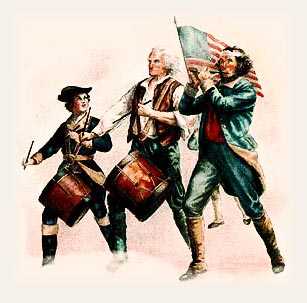 Asking the cause of the American Revolutionary War may be a little simplistic; civil wars pop up, all over the place, all the time. The more important question to ask, is why did this American Revolution have such a dramatic effect on the whole world?
Asking the cause of the American Revolutionary War may be a little simplistic; civil wars pop up, all over the place, all the time. The more important question to ask, is why did this American Revolution have such a dramatic effect on the whole world?
Pennsylvania Likes Private Property Private
 The King used to own the whole country. William Penn got us used to the idea that my property is mine, not the King's.
The King used to own the whole country. William Penn got us used to the idea that my property is mine, not the King's.
Original Intent and the Miranda Decision
 Right before our eyes, we can watch the Miranda decision migrate away from the original intent.
Right before our eyes, we can watch the Miranda decision migrate away from the original intent.
Last Will of Benjamin Franklin
 The Franklin Institute of Philadelphia has reproduced Dr. Franklin's last will and testament on the Internet. It is copied here for reader convenience.
The Franklin Institute of Philadelphia has reproduced Dr. Franklin's last will and testament on the Internet. It is copied here for reader convenience.
Regulation Precision: Not Entirely a Good Idea
Owen Roberts: A Switch in Time
Franklin Endorses the Constitution
WILLIAM BLATHWAYT'S DRAFT OF THE CHARTER OF PENNSYLVANIA
Political Parties, Absent and Unmentionable
Franklin Teaches Investing to Boston and Philadelphia
Net Neutrality and Vertical Integration
Do Computers Thrive on Lead Poisoning?
Adrift With The Living Constitution
Fort Wilson: Philadelphia 1779
Robert Morris: Businessman Father of the Bureaucracy
Reconsidering All Our Laws
Corporations: Property, but also Immortal Persons
How Could We Improve State Legislatures?
Void for Vagueness
Obamacare's Constitutionality
Sanctity of Contracts
John Marshall Decides Three Cases
Barnes Foundation -- Drawing a New Moral
 His old law firm devotes a reception room in his name, but not everyone is pleased with his writing the documents establishing the Barnes Foundation, or his capitulation to Franklin Roosevelt's threat to pack the US Supreme Court.
His old law firm devotes a reception room in his name, but not everyone is pleased with his writing the documents establishing the Barnes Foundation, or his capitulation to Franklin Roosevelt's threat to pack the US Supreme Court.
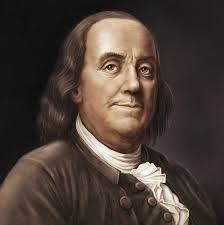 e3Benjamin Franklin never revealed his contributions to the formation of the U.S. Constitution, whether victories or defeats. When the final vote had been taken, he urged unanimous support by the delegates, in the following words.
e3Benjamin Franklin never revealed his contributions to the formation of the U.S. Constitution, whether victories or defeats. When the final vote had been taken, he urged unanimous support by the delegates, in the following words.
William Blathwayt was clerk of the British Board of Trade. His draft of Penn's charter for Pennsylvania was essentially a staff proposal for the King to sign. It conforms to the final charter in all but minor wording [,punctuation, and emphasis marks].
 Our Constitution is much praised for exquisitely balancing power between the three branches of government. It would even be an achievement to require two centuries to find a way to unbalance them.
Our Constitution is much praised for exquisitely balancing power between the three branches of government. It would even be an achievement to require two centuries to find a way to unbalance them.
 In 1789, B. Franklin changed the nature of his last will and testament from conventional to highly unconventional.
In 1789, B. Franklin changed the nature of his last will and testament from conventional to highly unconventional.
 Net neutrality is a new issue with several other issues buried in it. Here we take up its relation to antitrust, particularly the legal concept of vertical integration.
Net neutrality is a new issue with several other issues buried in it. Here we take up its relation to antitrust, particularly the legal concept of vertical integration.
 There's a rumor that regulations prohibiting lead in solder will shorten the life of computers.
There's a rumor that regulations prohibiting lead in solder will shorten the life of computers.
.jpg) With apologies to any political tricks left unmentioned.
With apologies to any political tricks left unmentioned.
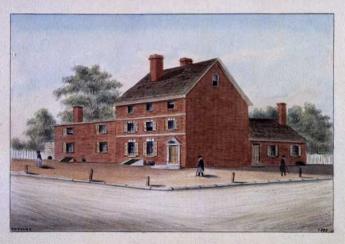 History was made at 3rd and Walnut, but so far, is unmarked.
History was made at 3rd and Walnut, but so far, is unmarked.
 Only a few days after being appointed Financier, or acting President of the United States before the Constitution, Robert Morris swept away Congressional committees and replaced them with administrative employees.
Only a few days after being appointed Financier, or acting President of the United States before the Constitution, Robert Morris swept away Congressional committees and replaced them with administrative employees.
 The legislatures of America were handed a clean slate for statutes by the 1787 Constitution, and thus given the opportunity to review the entirely legal system. It took nearly a century to accomplish and is still proceeding.
The legislatures of America were handed a clean slate for statutes by the 1787 Constitution, and thus given the opportunity to review the entirely legal system. It took nearly a century to accomplish and is still proceeding.
 There had been a few stockholder corporations, dating back to the Dutch East India Corporation and the Proprietors of West Jersey. The Industrial Revolution greatly encouraged this business structure, but America got the jump on the rest of the world by some happenstances.
There had been a few stockholder corporations, dating back to the Dutch East India Corporation and the Proprietors of West Jersey. The Industrial Revolution greatly encouraged this business structure, but America got the jump on the rest of the world by some happenstances.
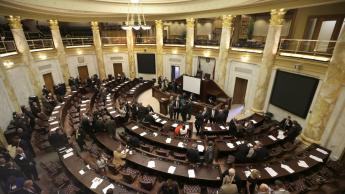 If state legislatures are as bad as their reputation, we ought to be asking questions. Like, how did they get that reputation, and what can improve it?
If state legislatures are as bad as their reputation, we ought to be asking questions. Like, how did they get that reputation, and what can improve it?
 Ignorance of the law is no excuse, but what about a law that is deliberately vague?
Ignorance of the law is no excuse, but what about a law that is deliberately vague?
 Obamacare's constitutionality was argued before the U.S. Supreme Court in late March, 2012.
Obamacare's constitutionality was argued before the U.S. Supreme Court in late March, 2012.
 Article I of the Constitution, states in section10 that "No state shall......pass any law.....impairing the obligation of contracts, or grant any title of nobility." While the Constitution does not precisely say the Congress may not do so, or the President might not, it is definitely omitted from the list of limited federal powers. And it is the enduring expectation of the citizenry that the federal government is no more encouraged to impair the sanctity of contracts than to grant titles of nobility.
Article I of the Constitution, states in section10 that "No state shall......pass any law.....impairing the obligation of contracts, or grant any title of nobility." While the Constitution does not precisely say the Congress may not do so, or the President might not, it is definitely omitted from the list of limited federal powers. And it is the enduring expectation of the citizenry that the federal government is no more encouraged to impair the sanctity of contracts than to grant titles of nobility.
 Marbury v Madison (1803), Martin v Hunter's Lessee (1816), and McCullough v Maryland (1819) -- these three cases were the ones where John Marshall changed judicial history. Taught in law school as case law, they are more accurately moments of national history.
Marbury v Madison (1803), Martin v Hunter's Lessee (1816), and McCullough v Maryland (1819) -- these three cases were the ones where John Marshall changed judicial history. Taught in law school as case law, they are more accurately moments of national history.
 Inflation makes for a new slant on the saga of the Barnes Foundation.
Inflation makes for a new slant on the saga of the Barnes Foundation.